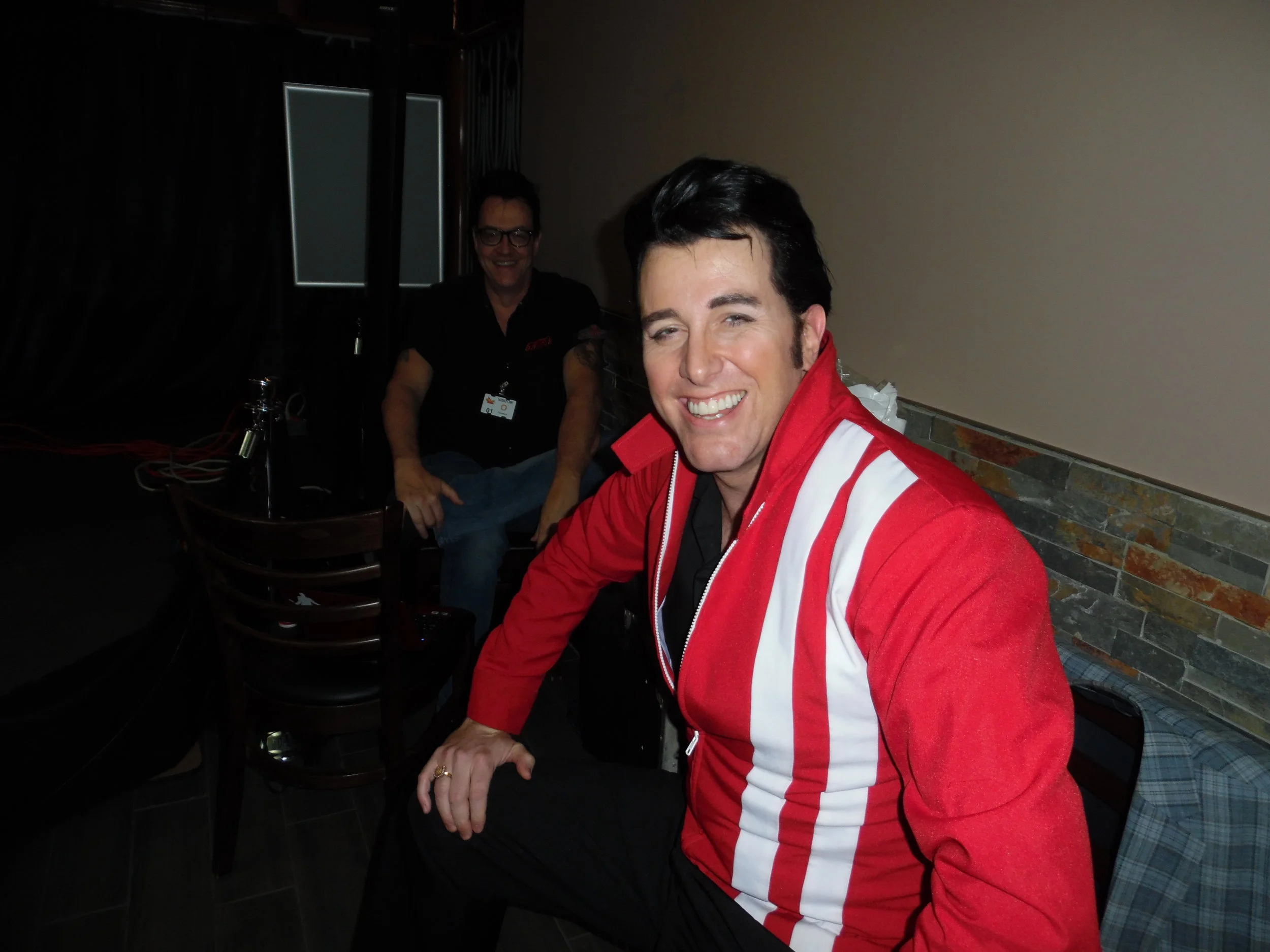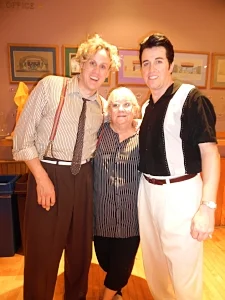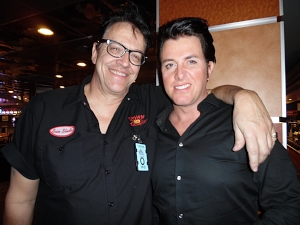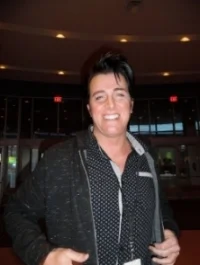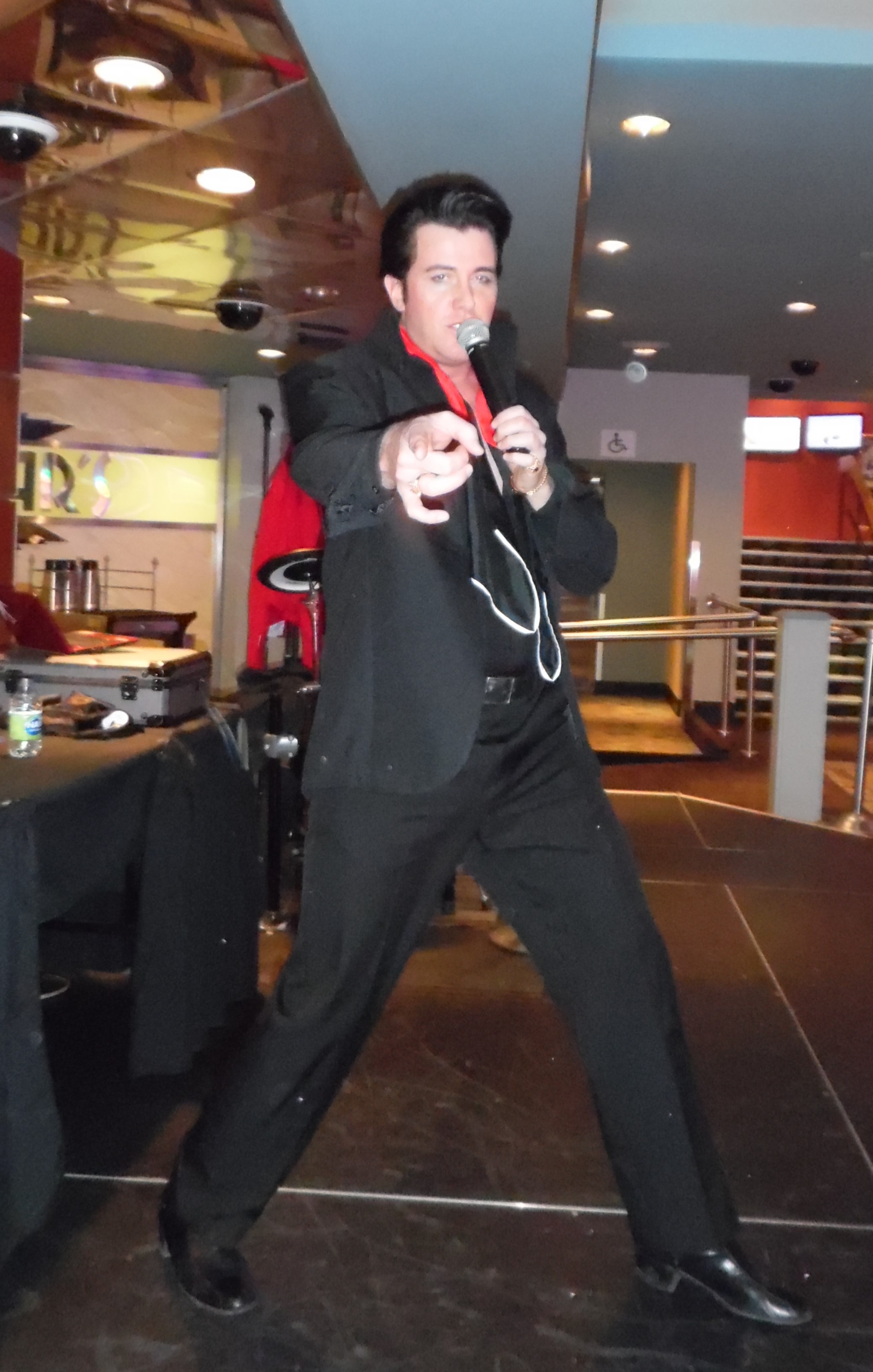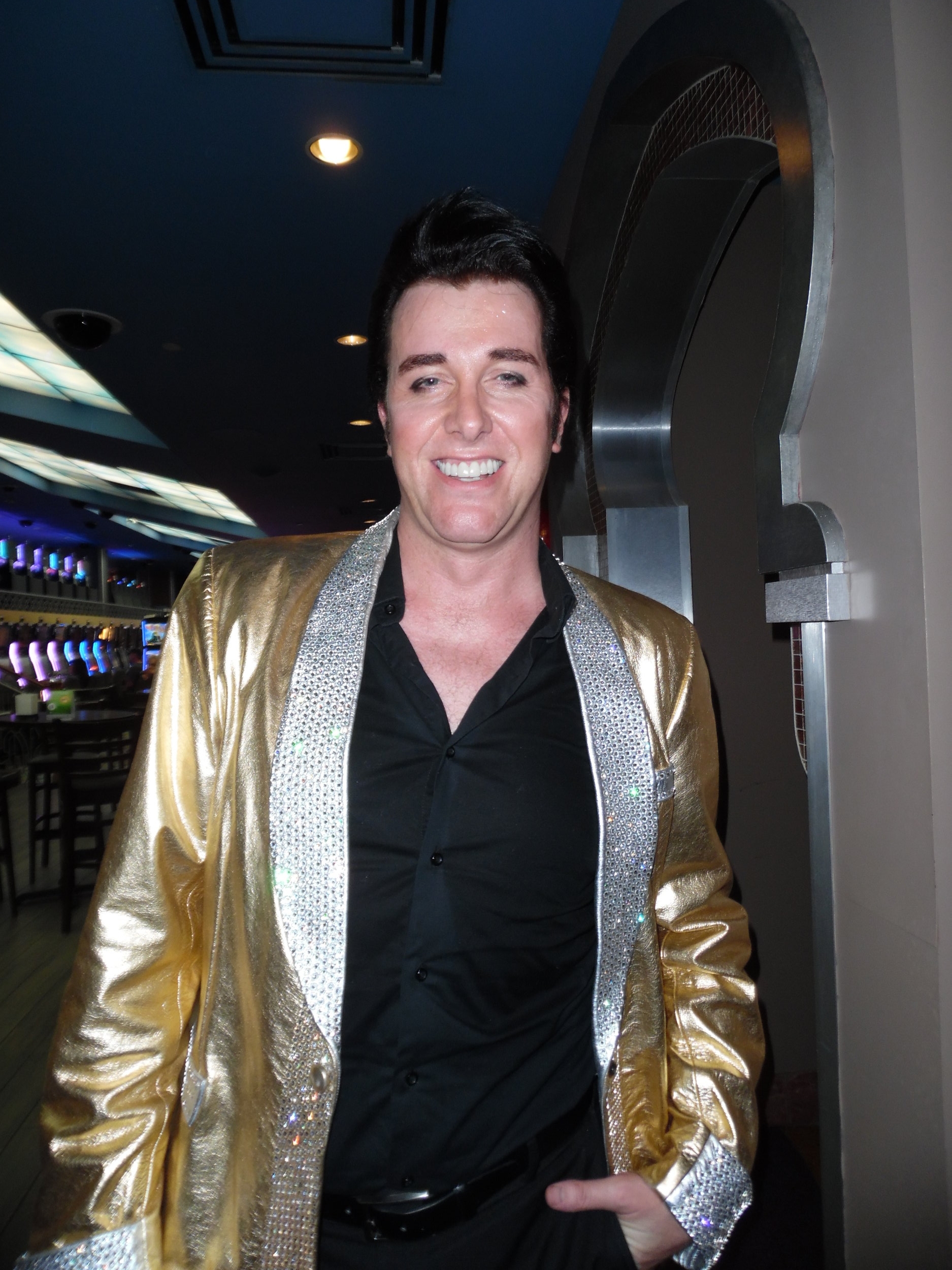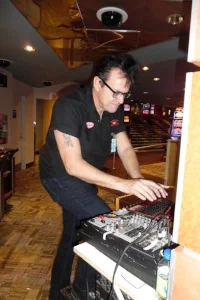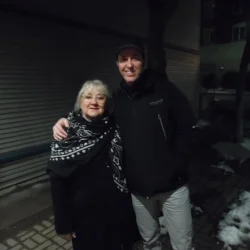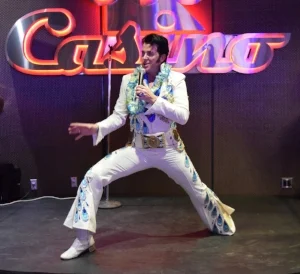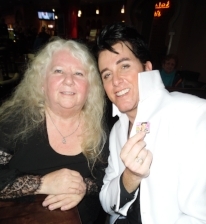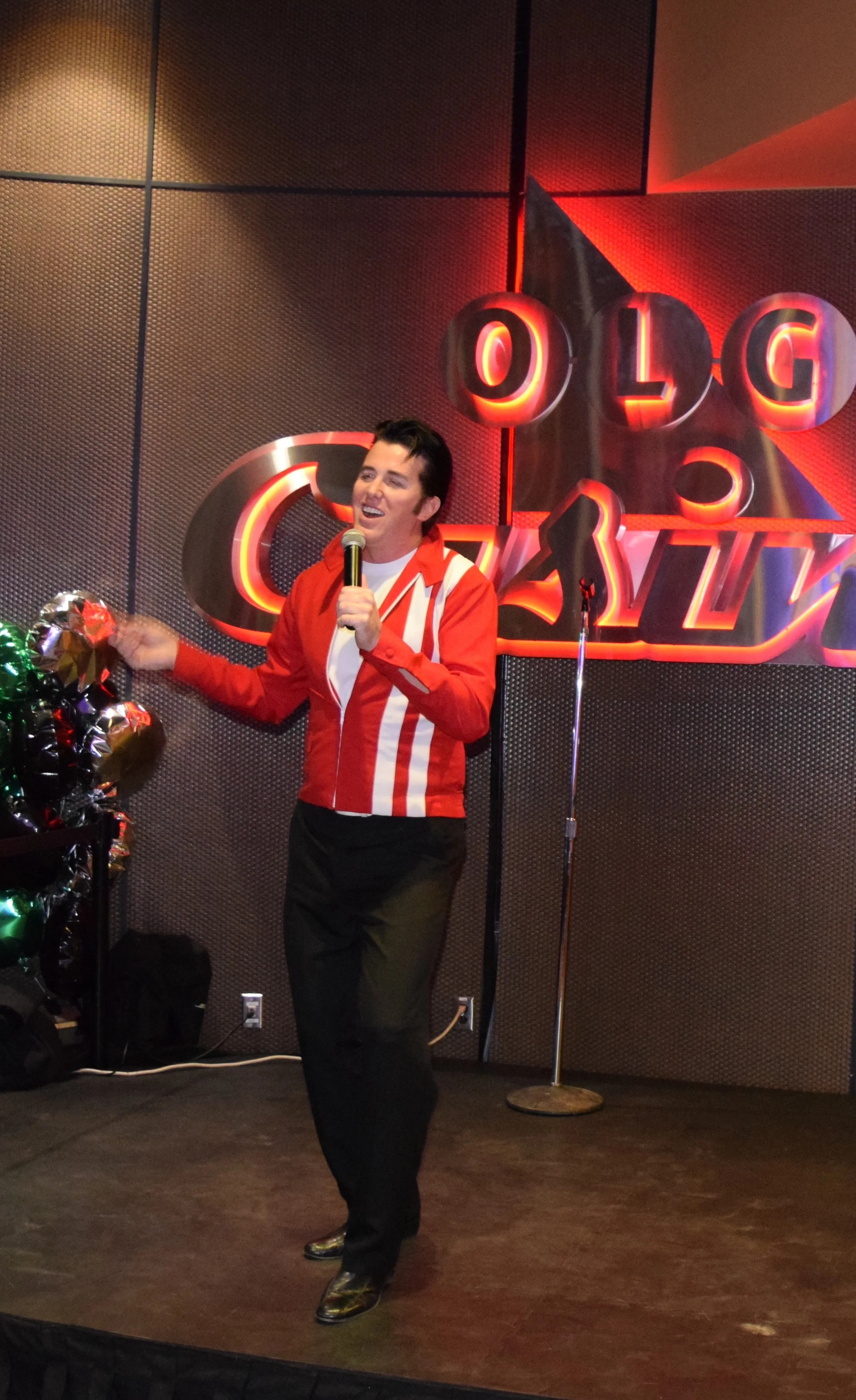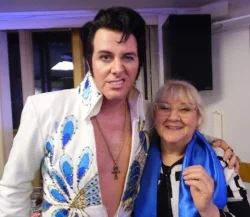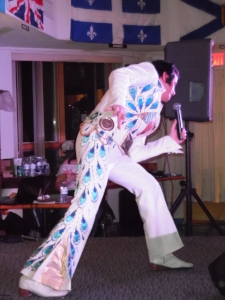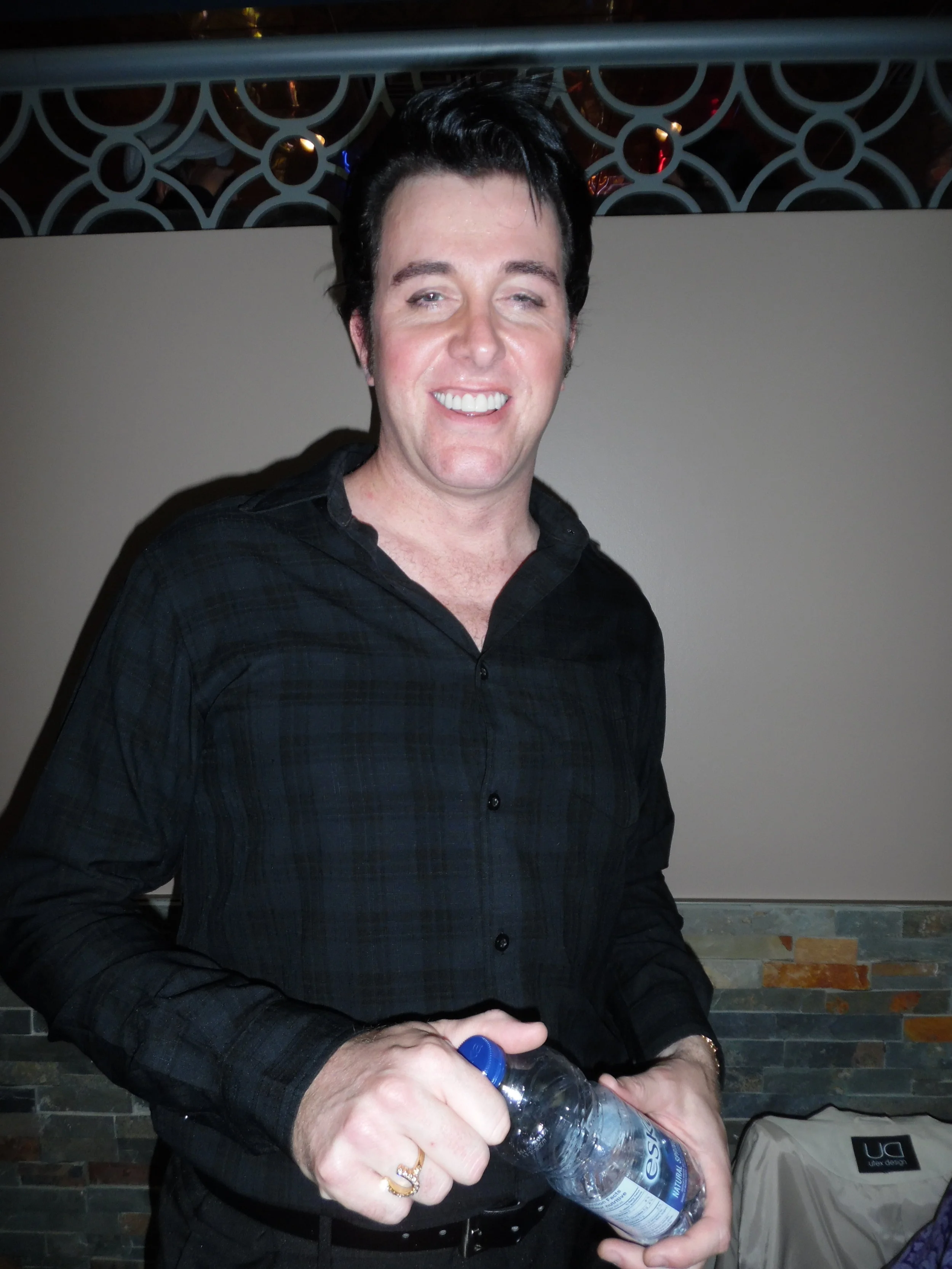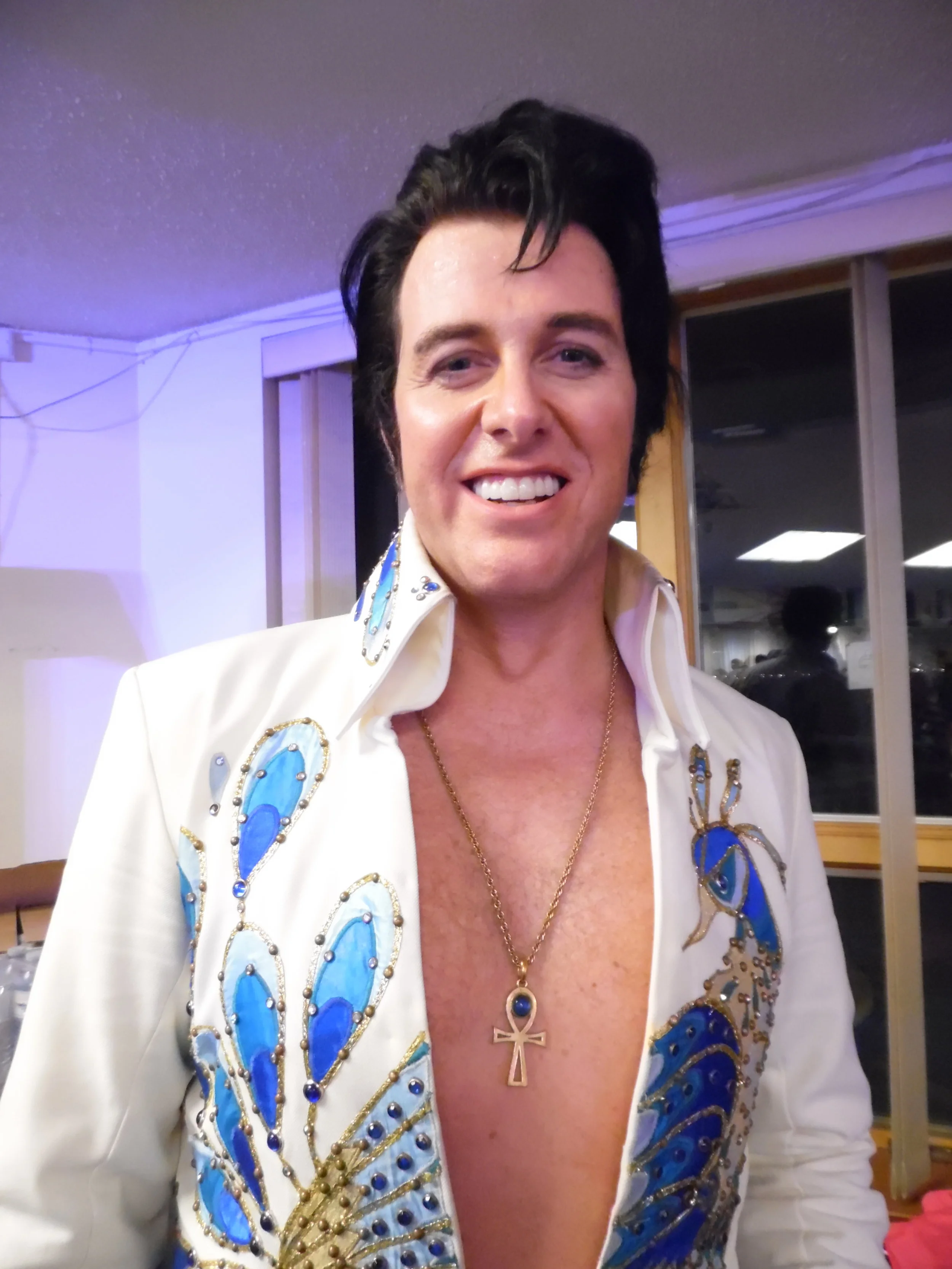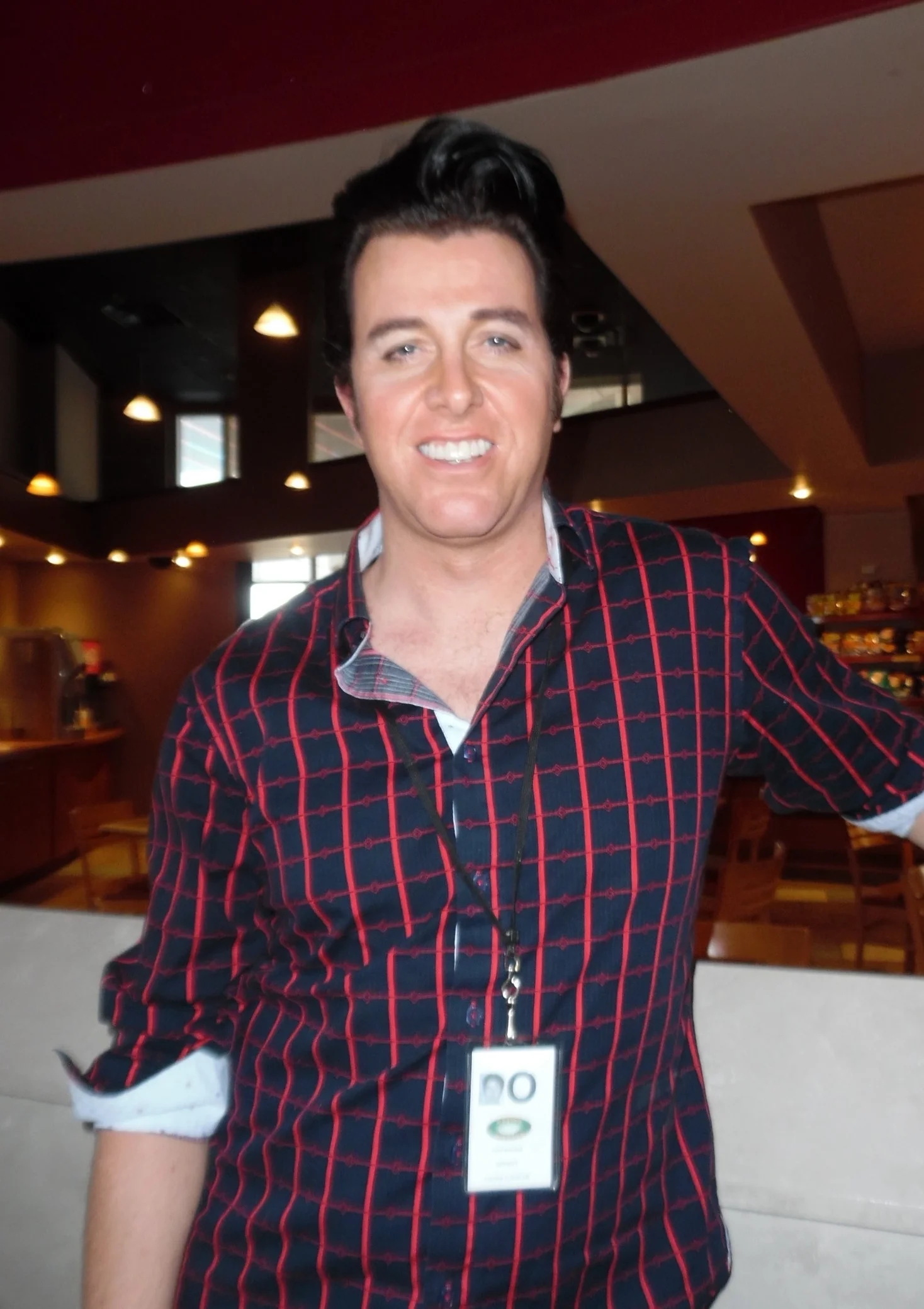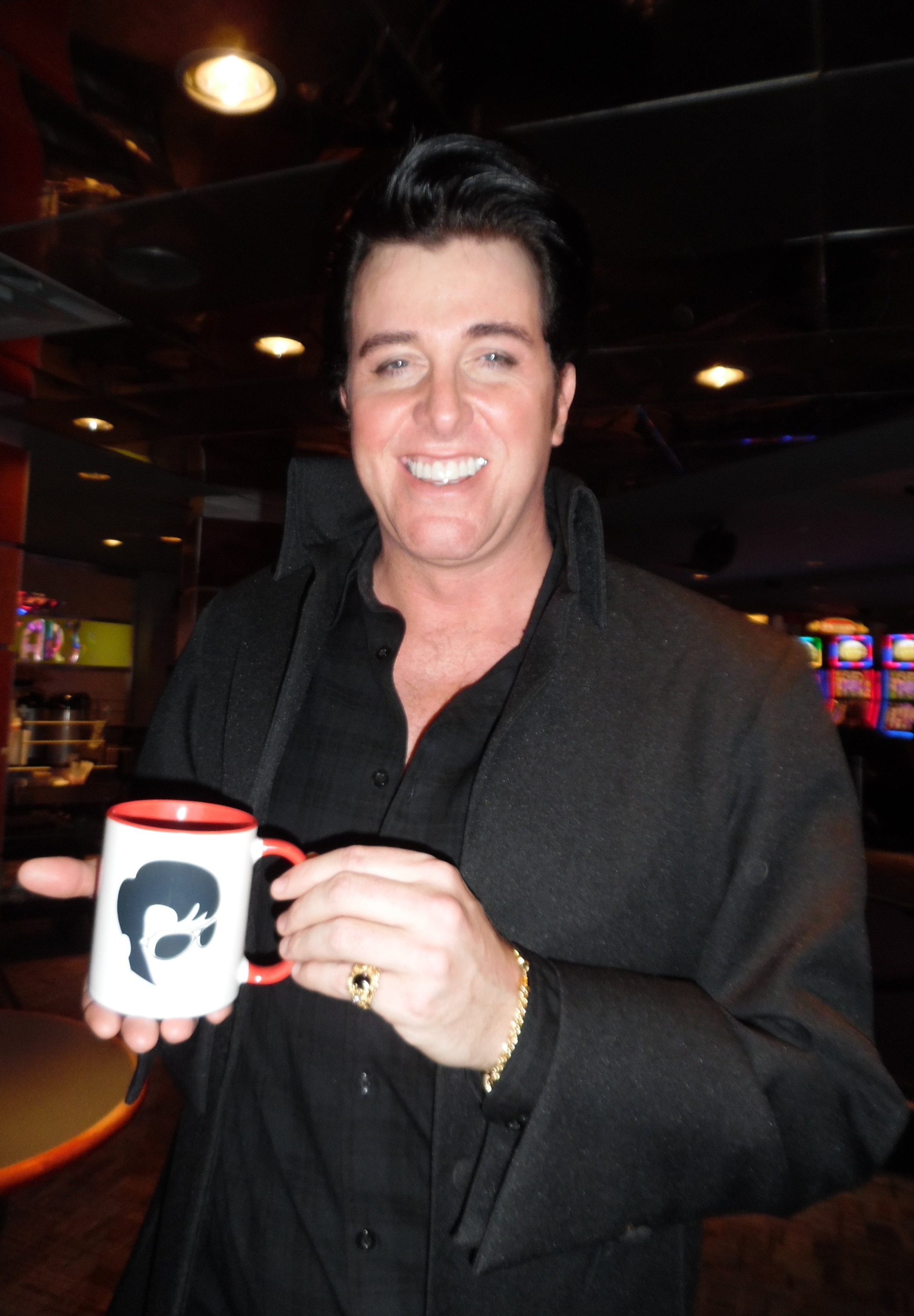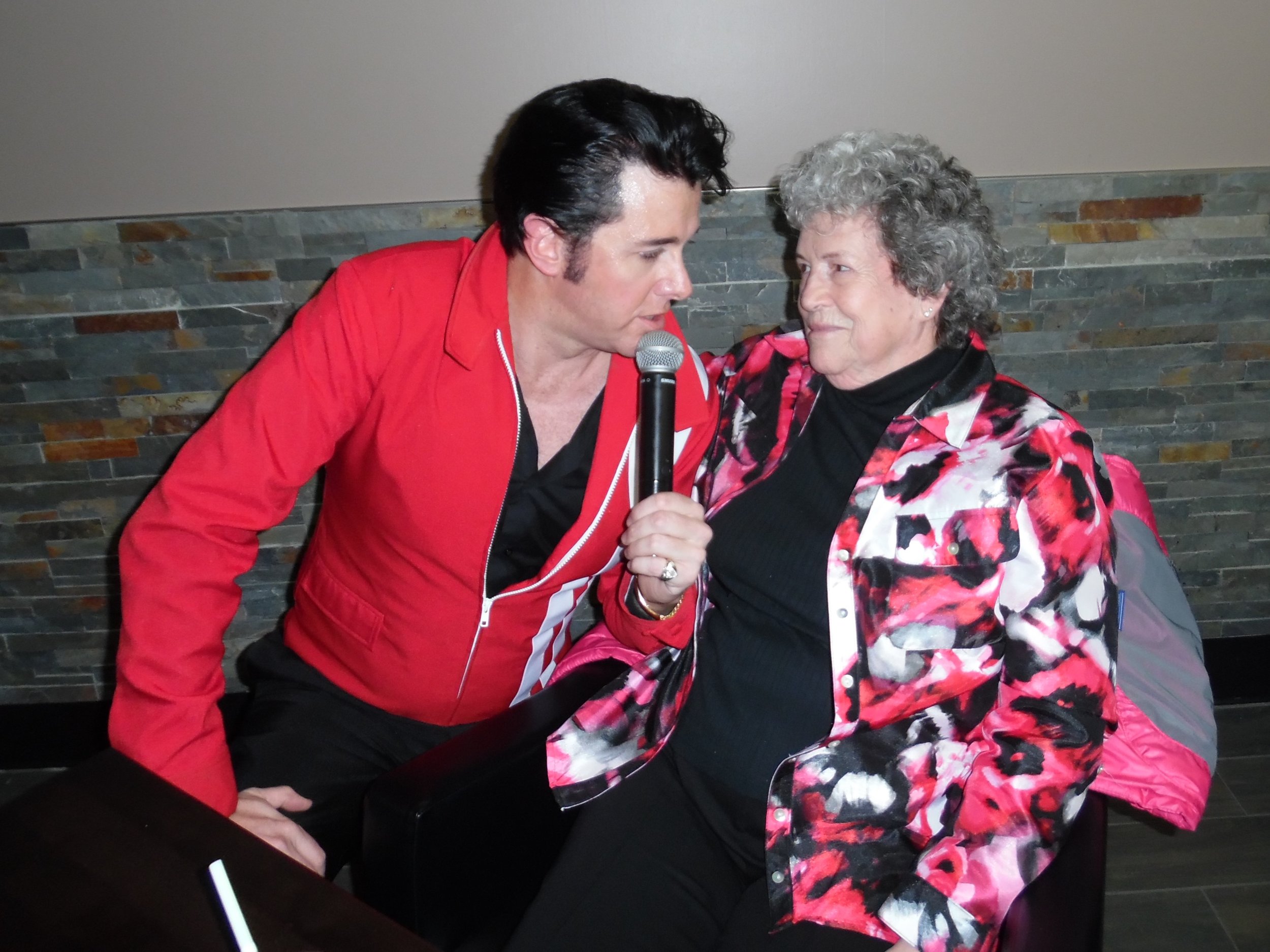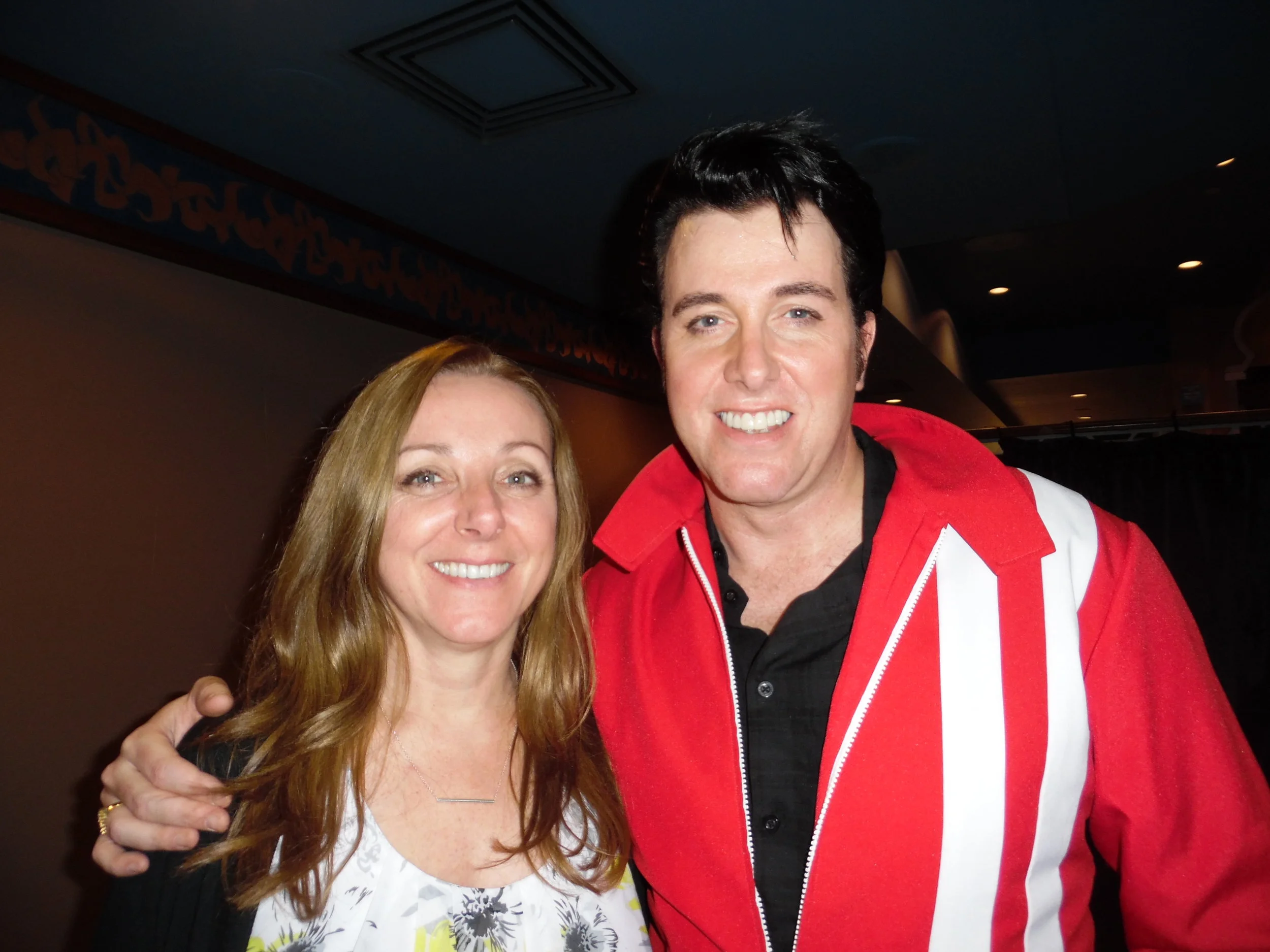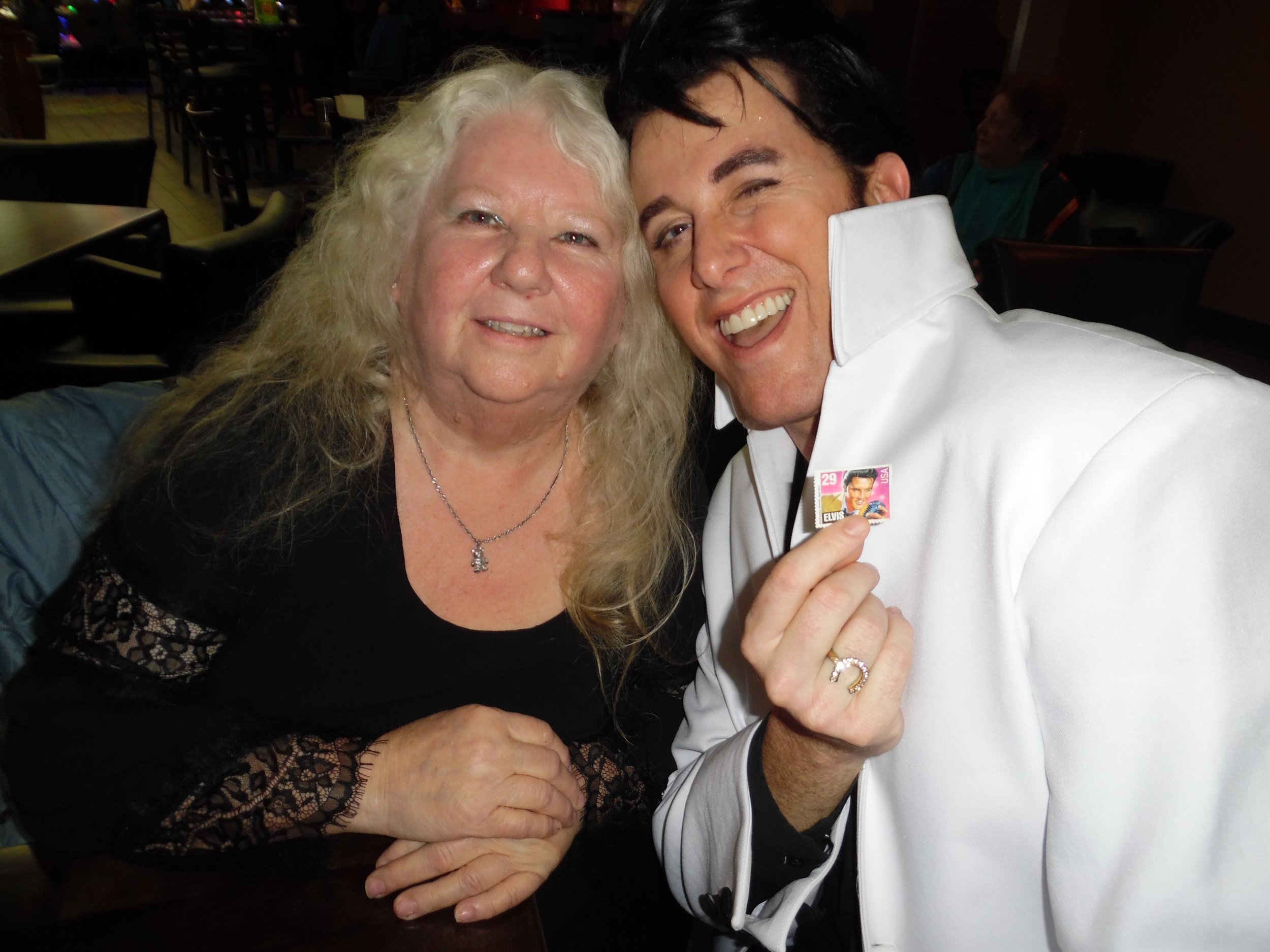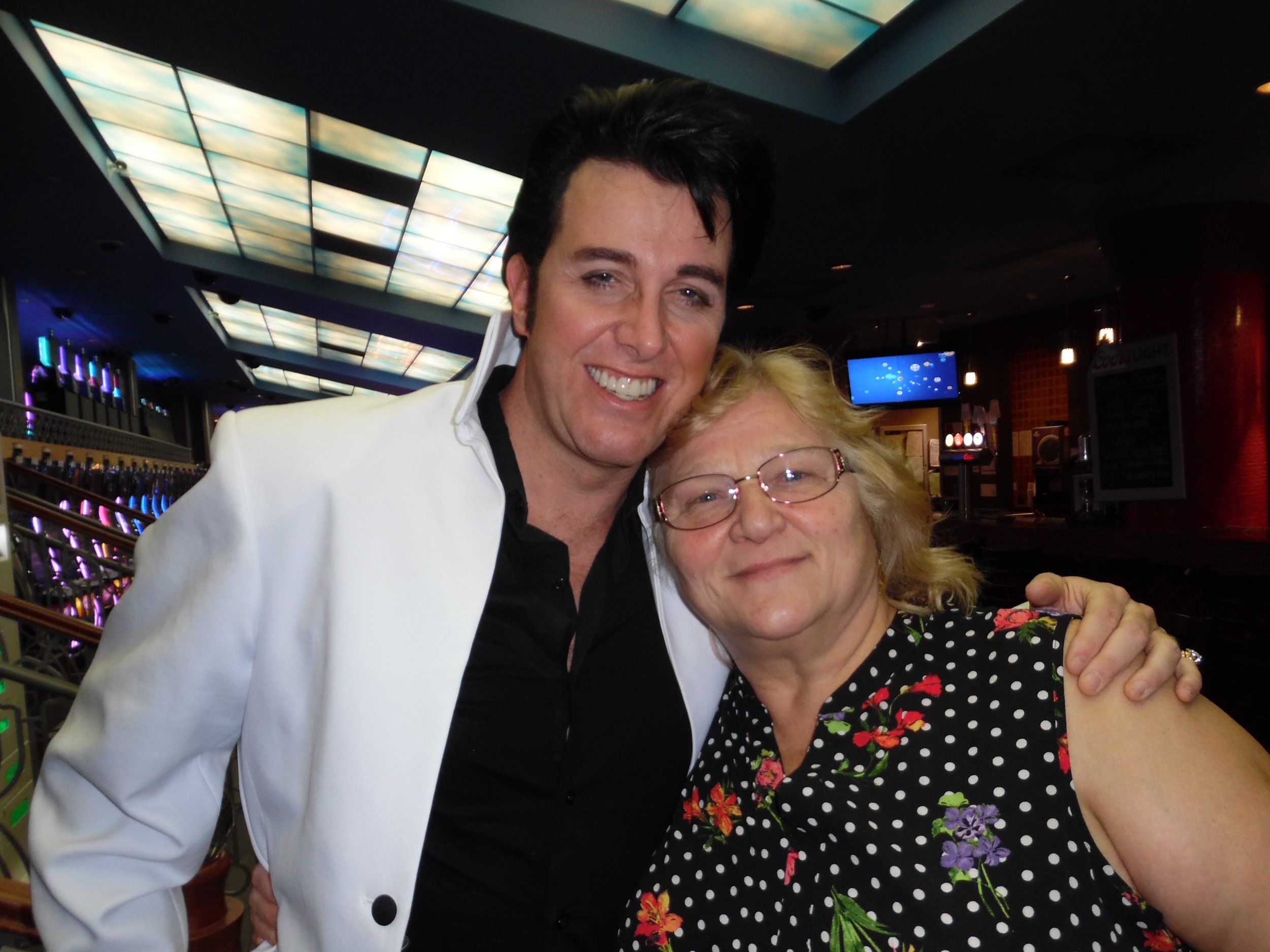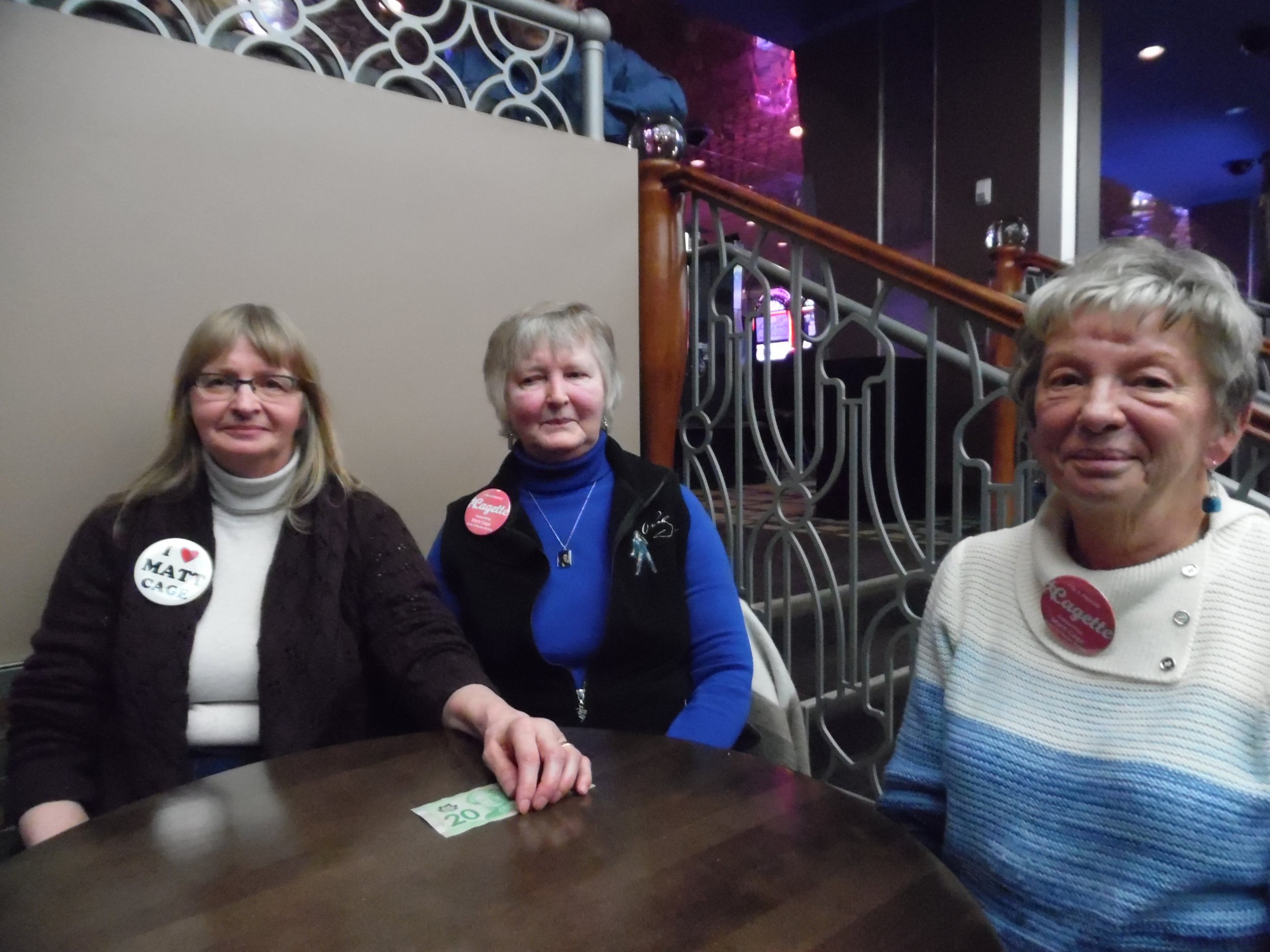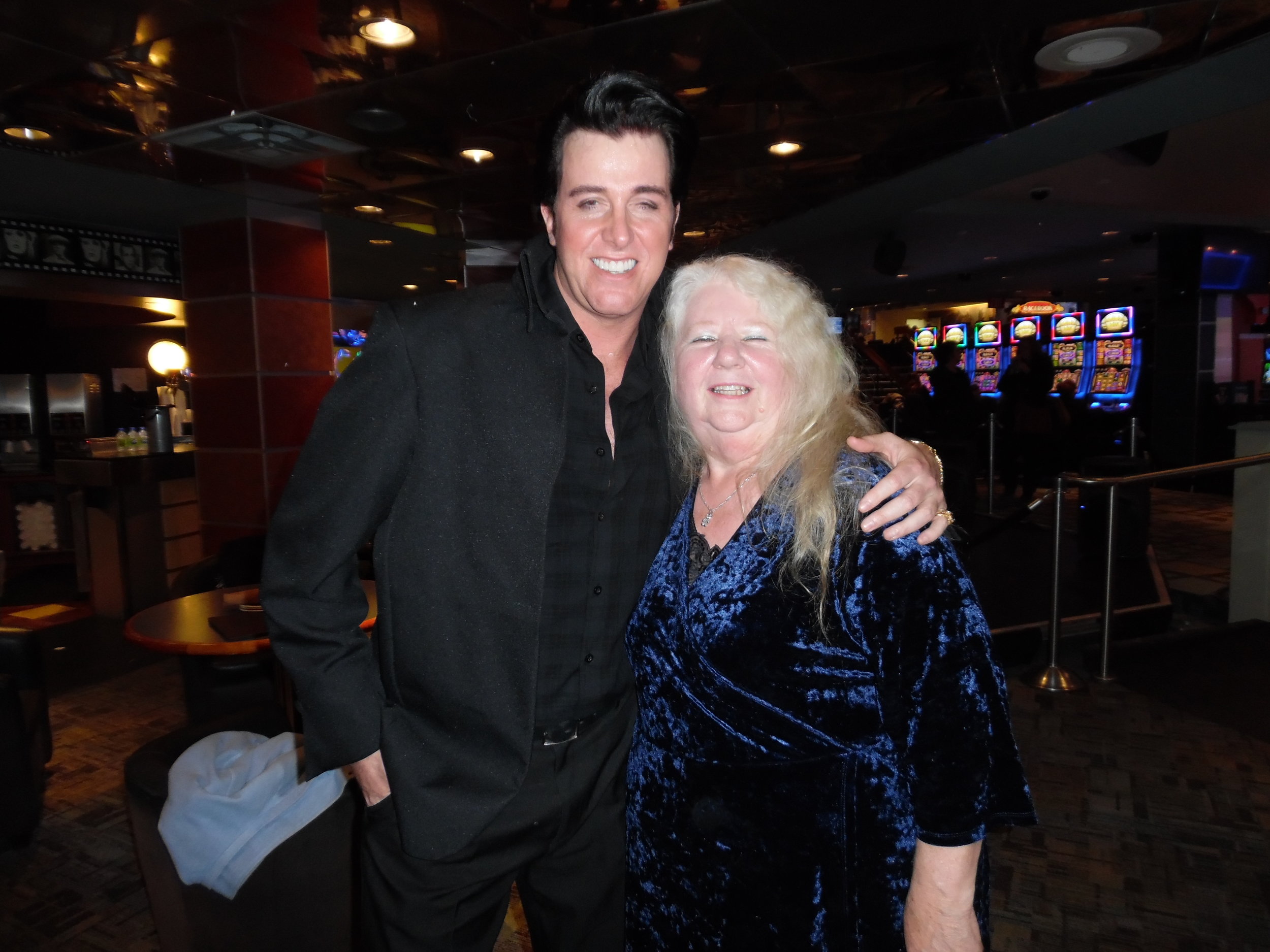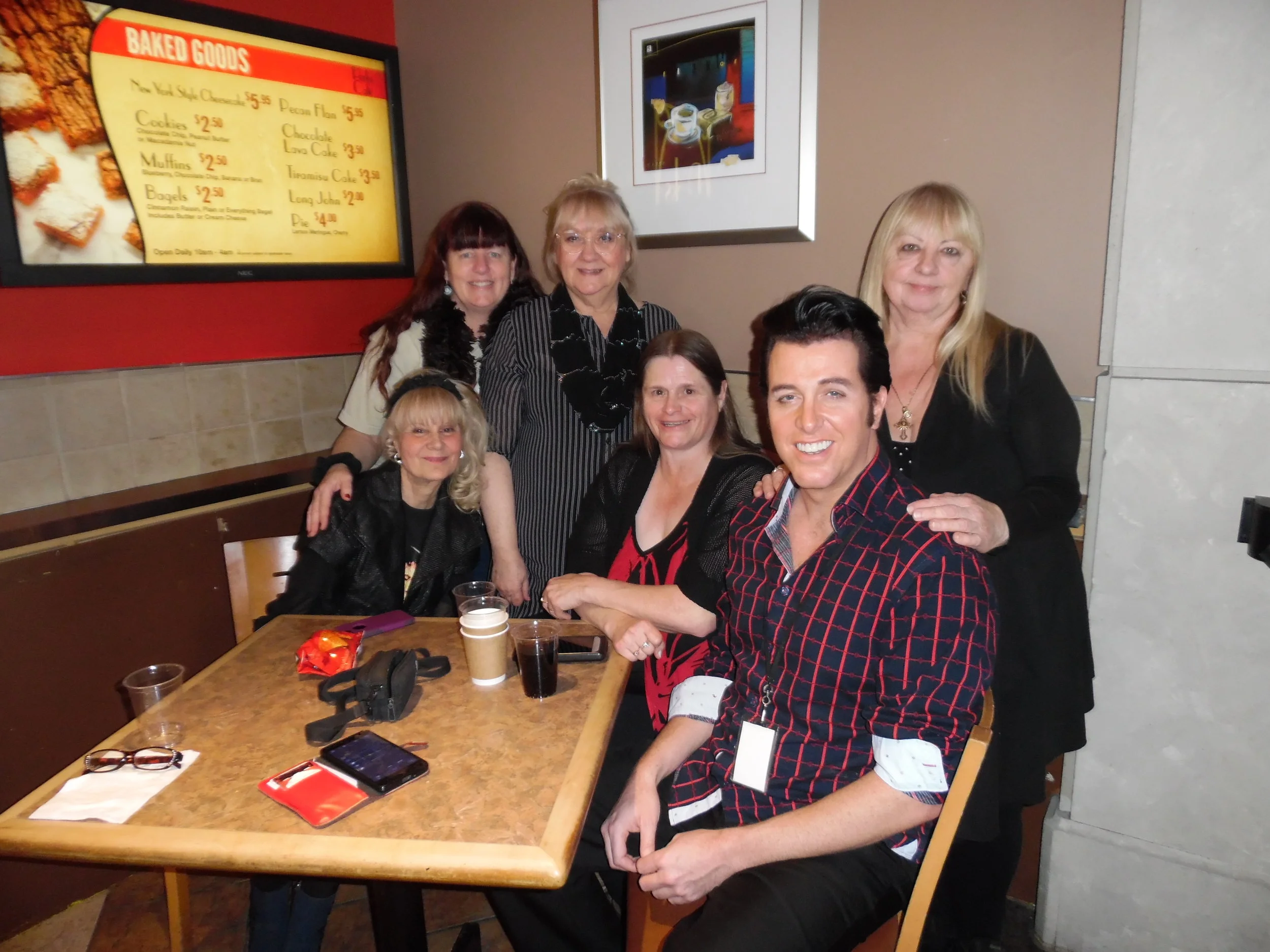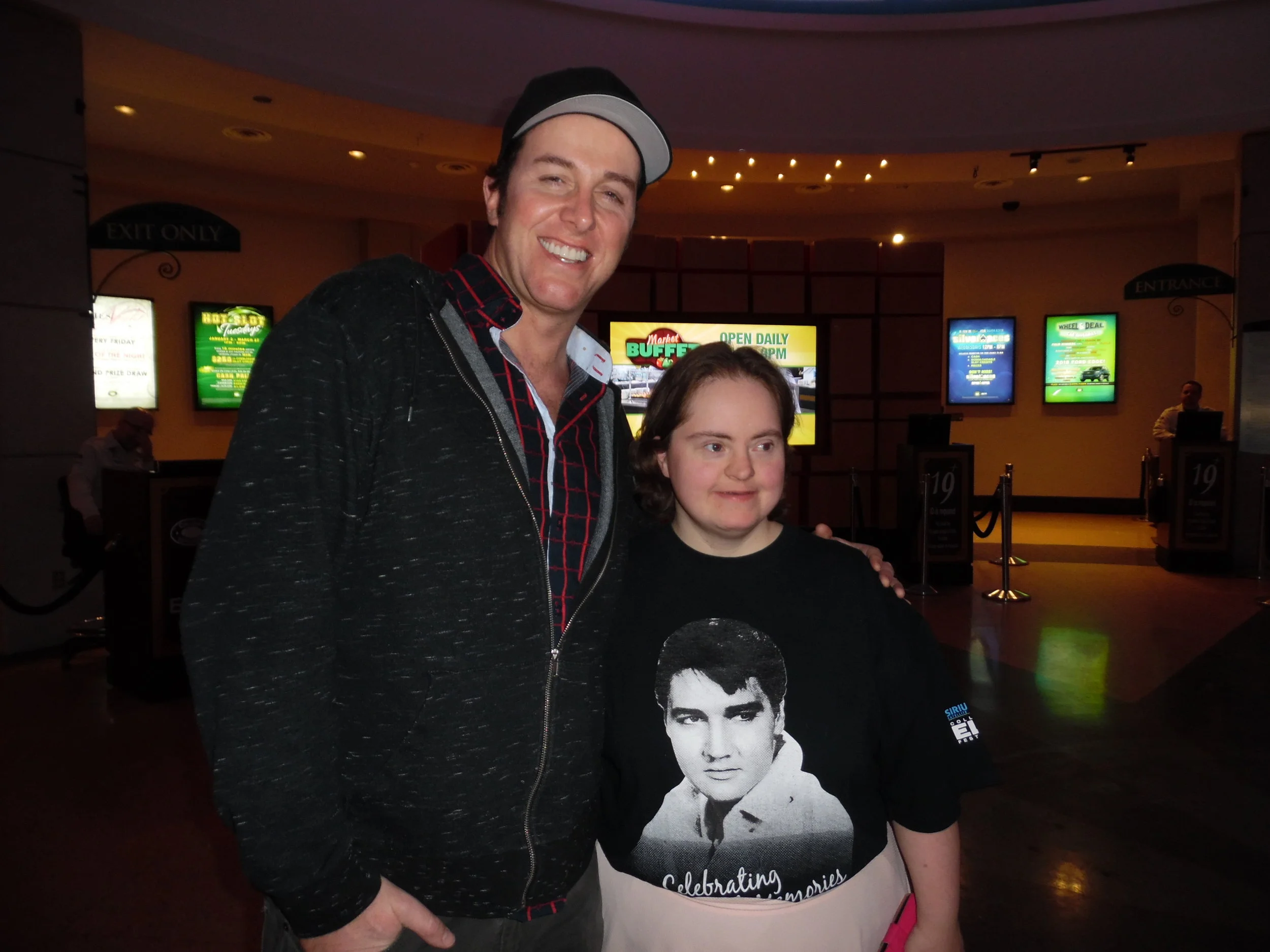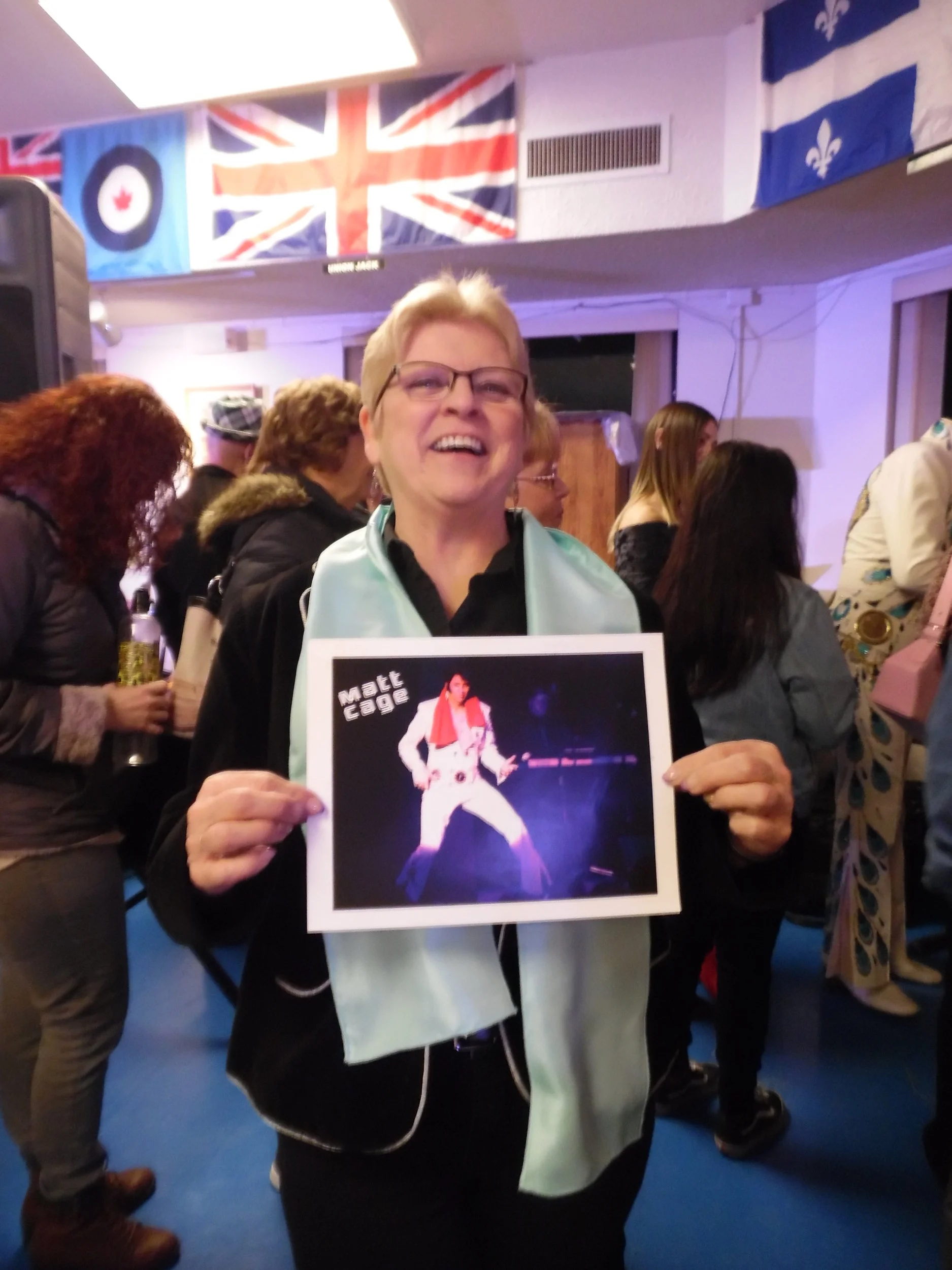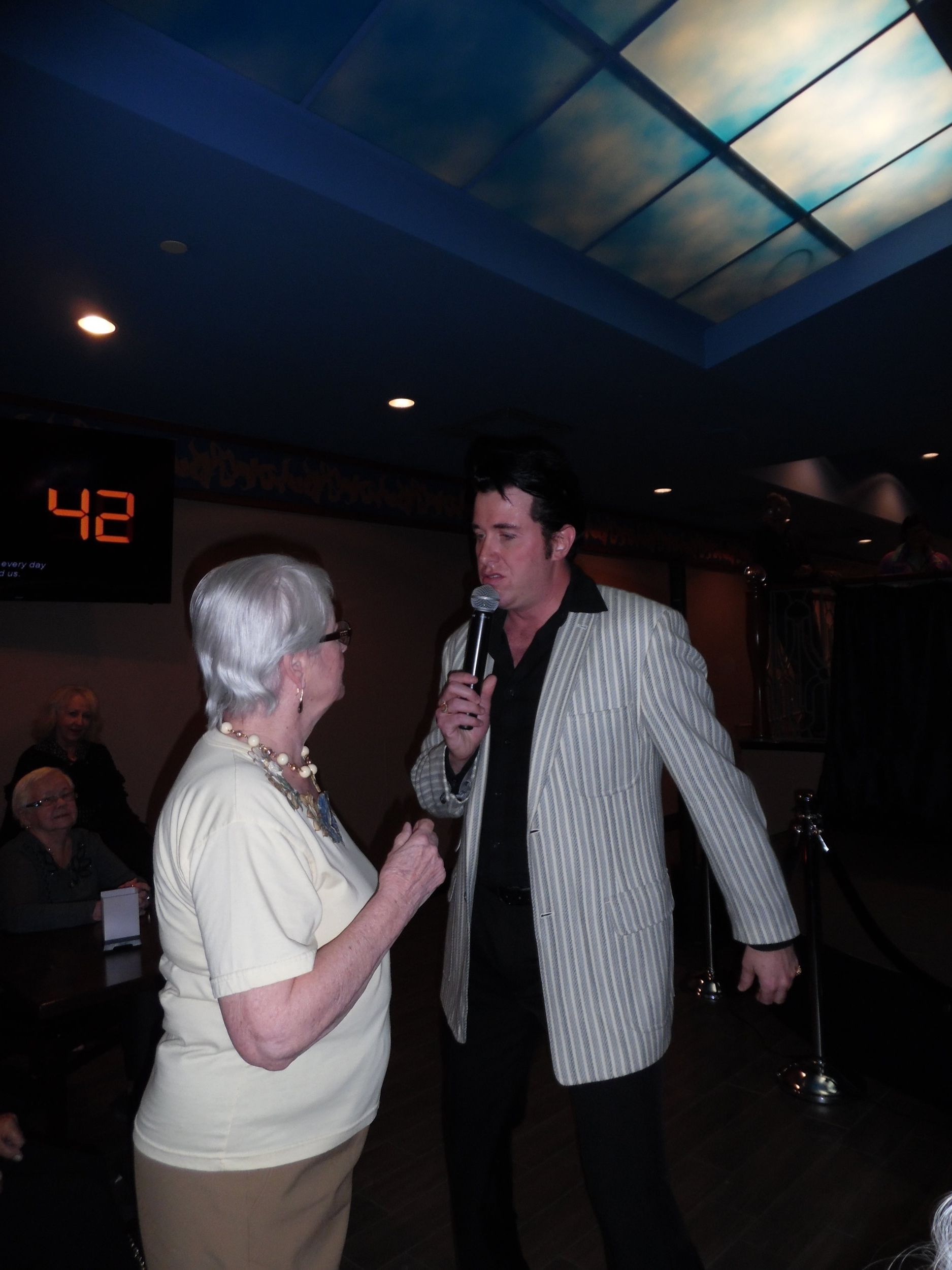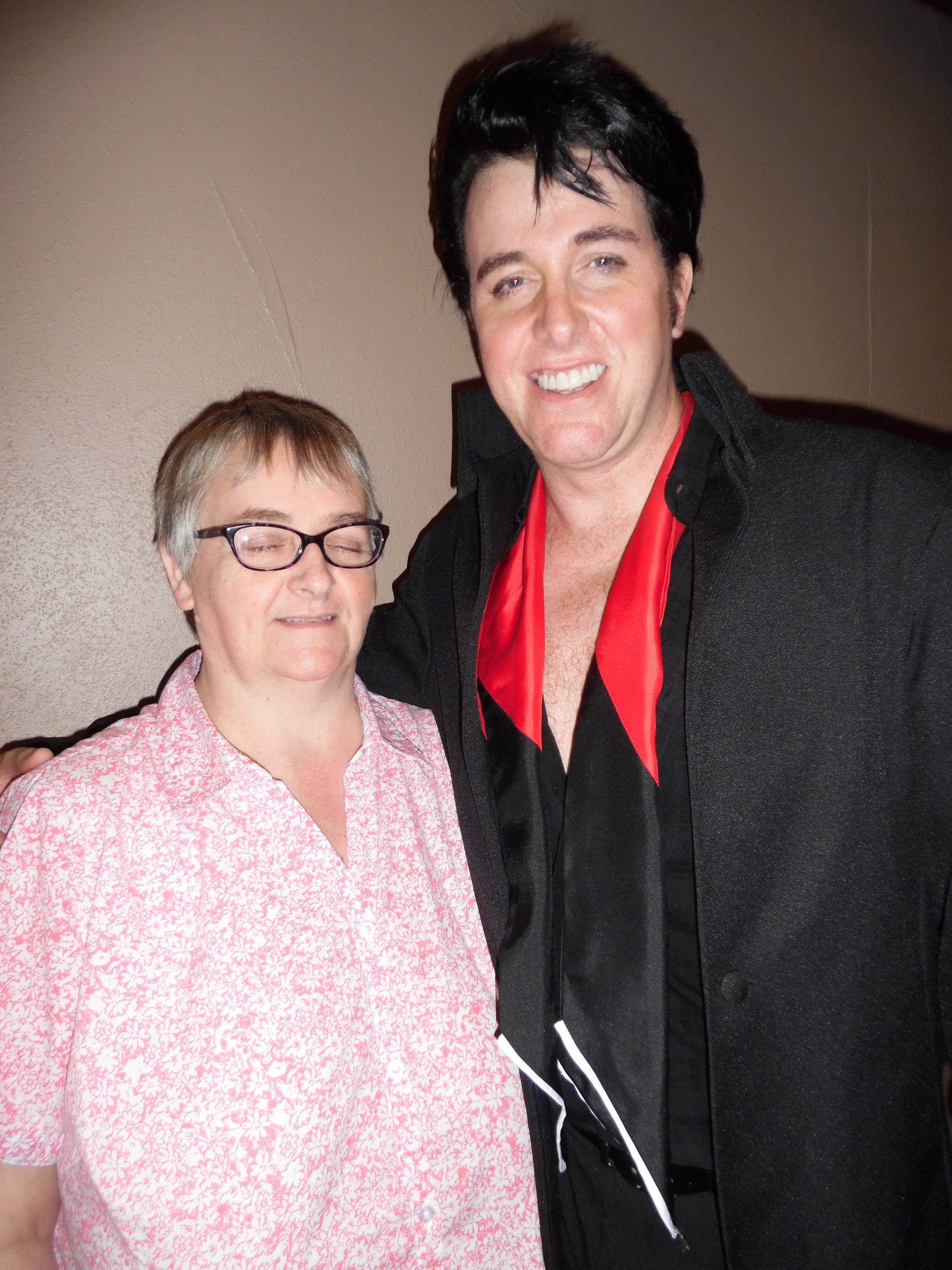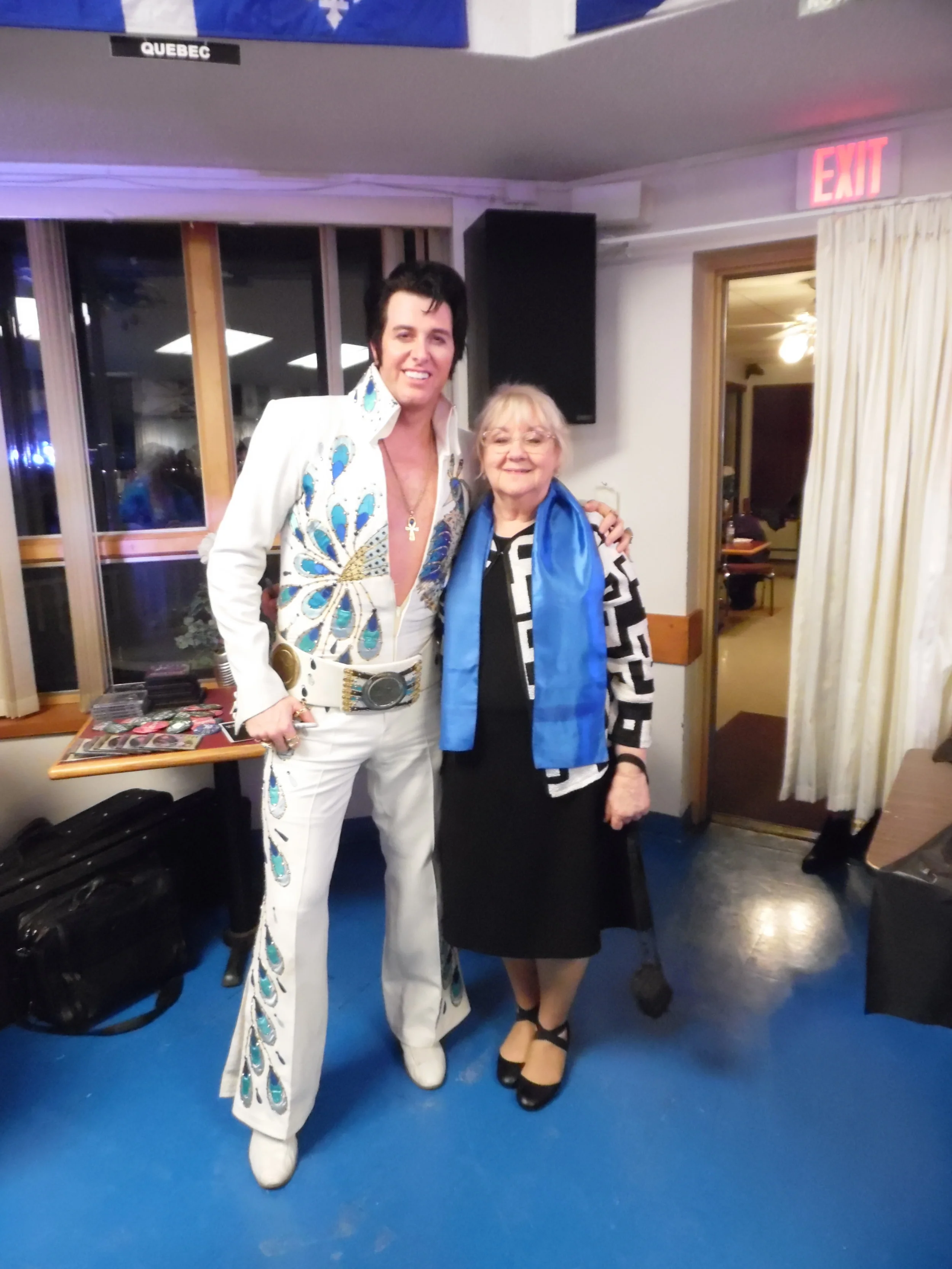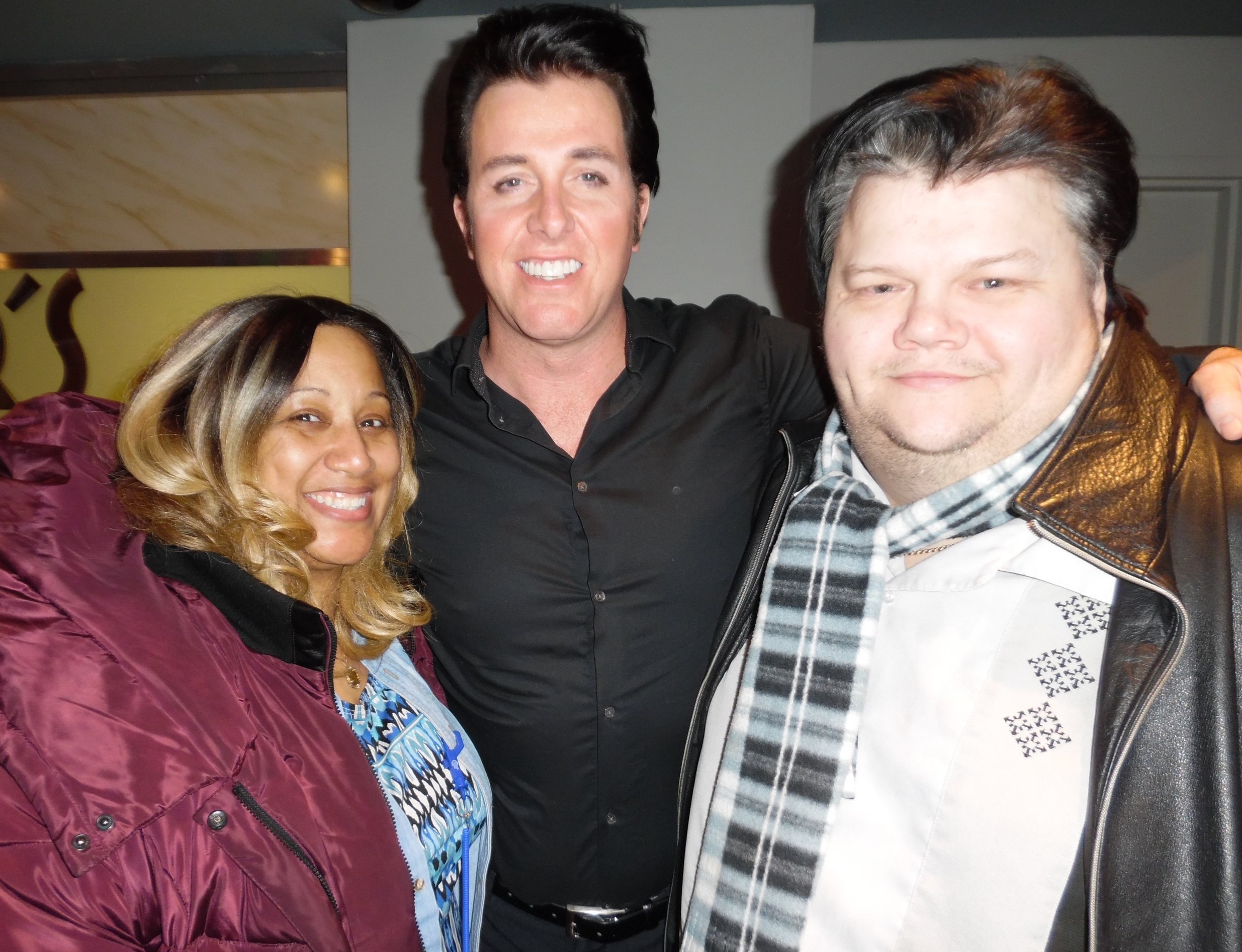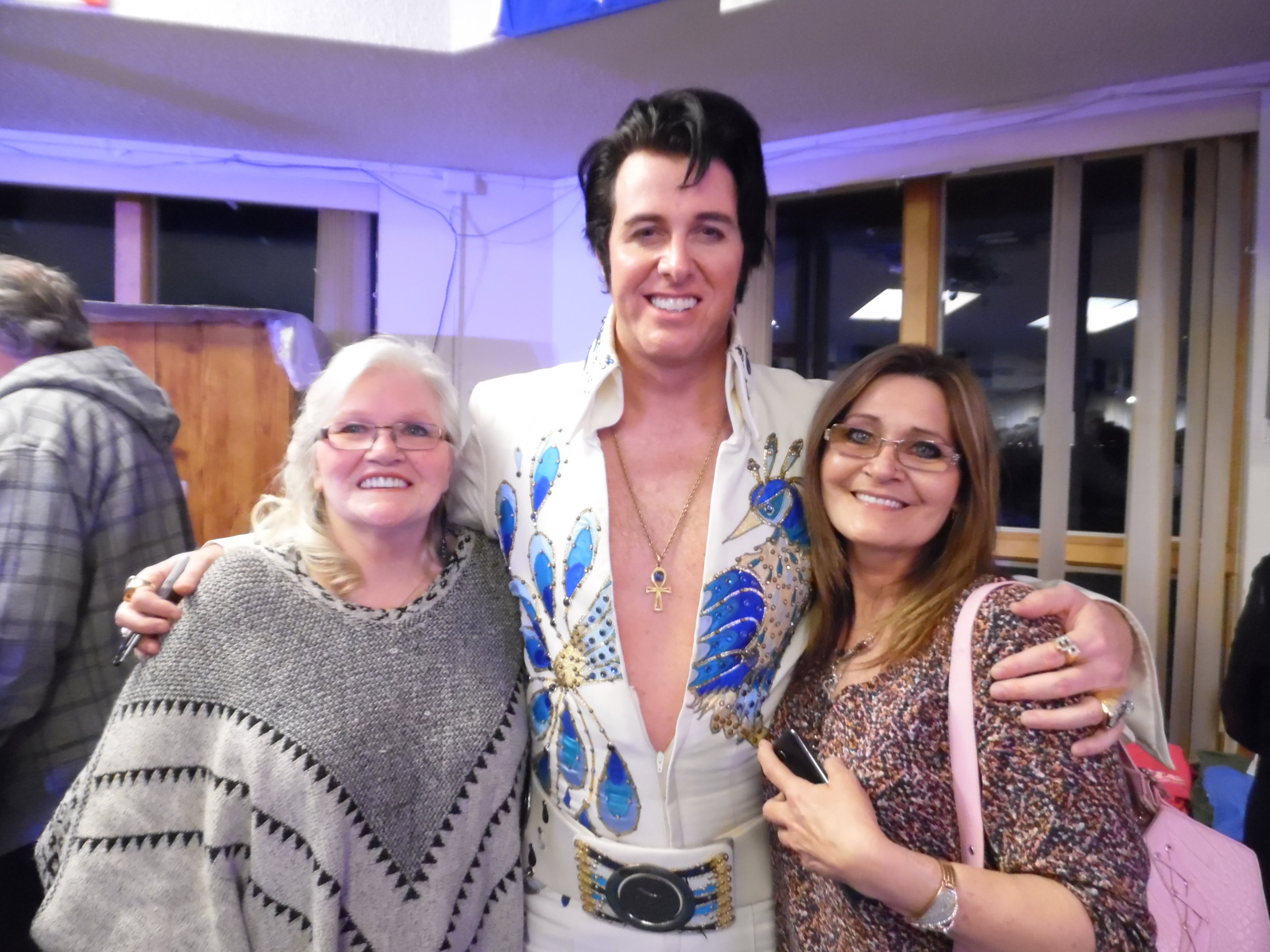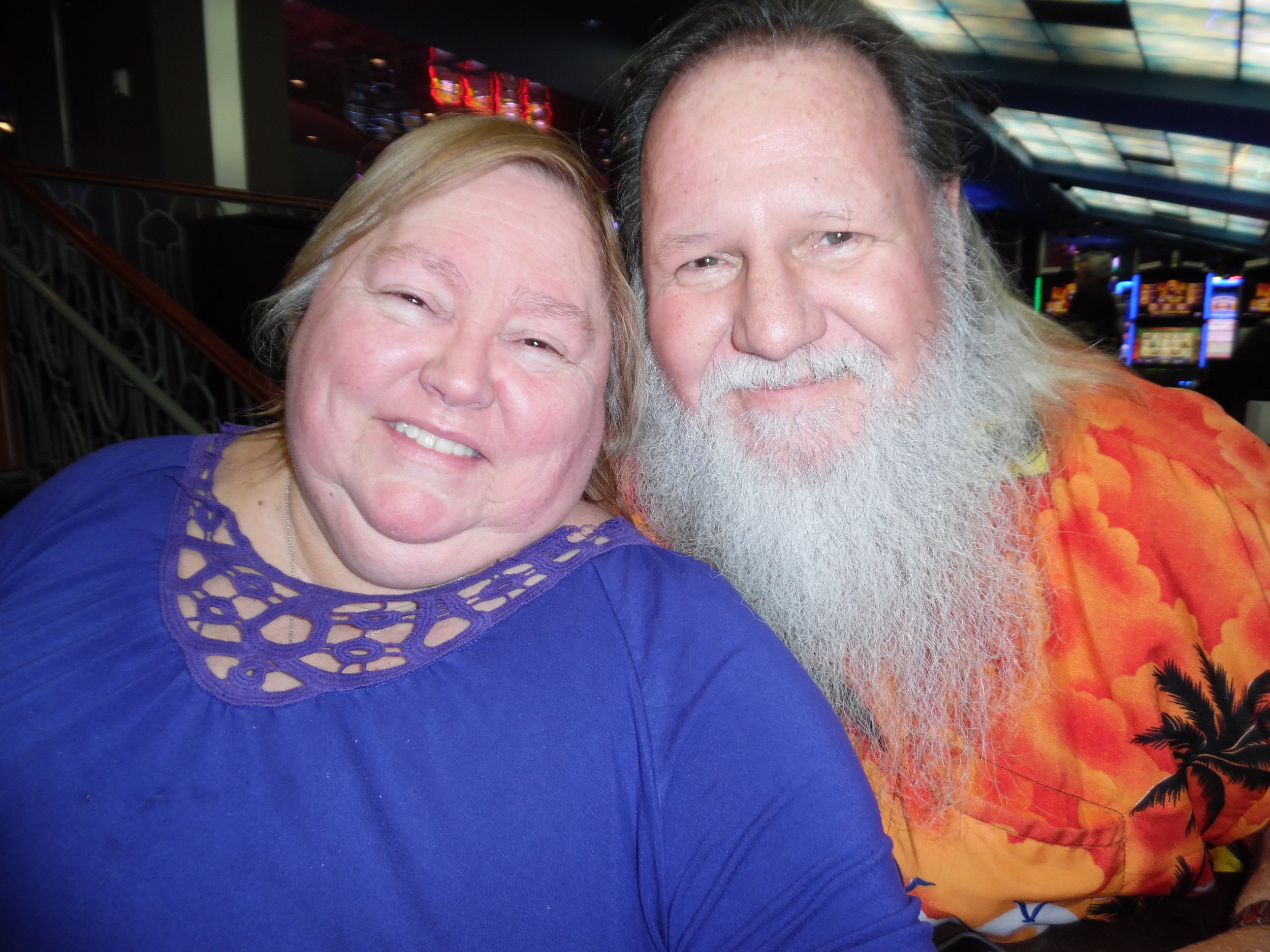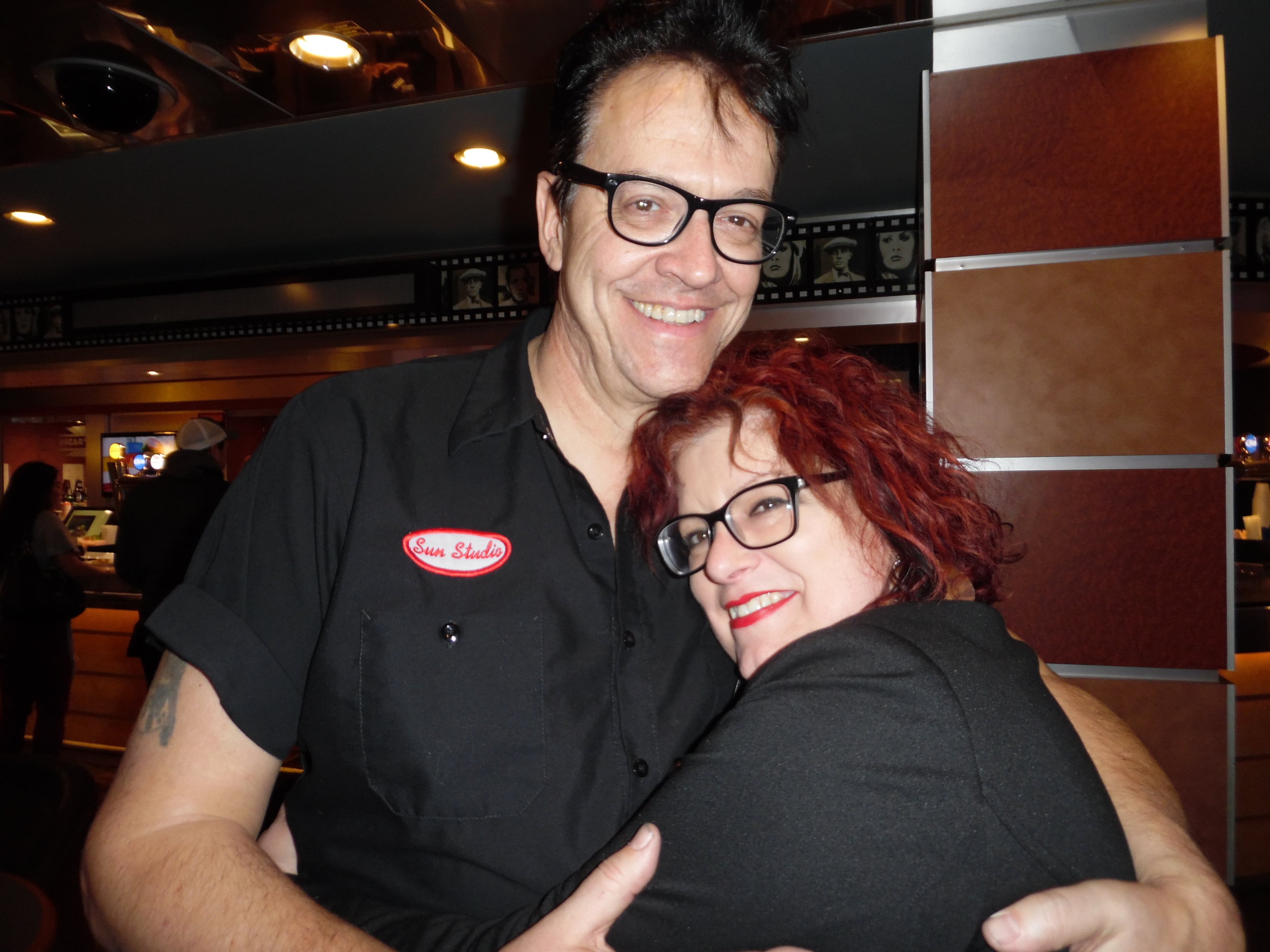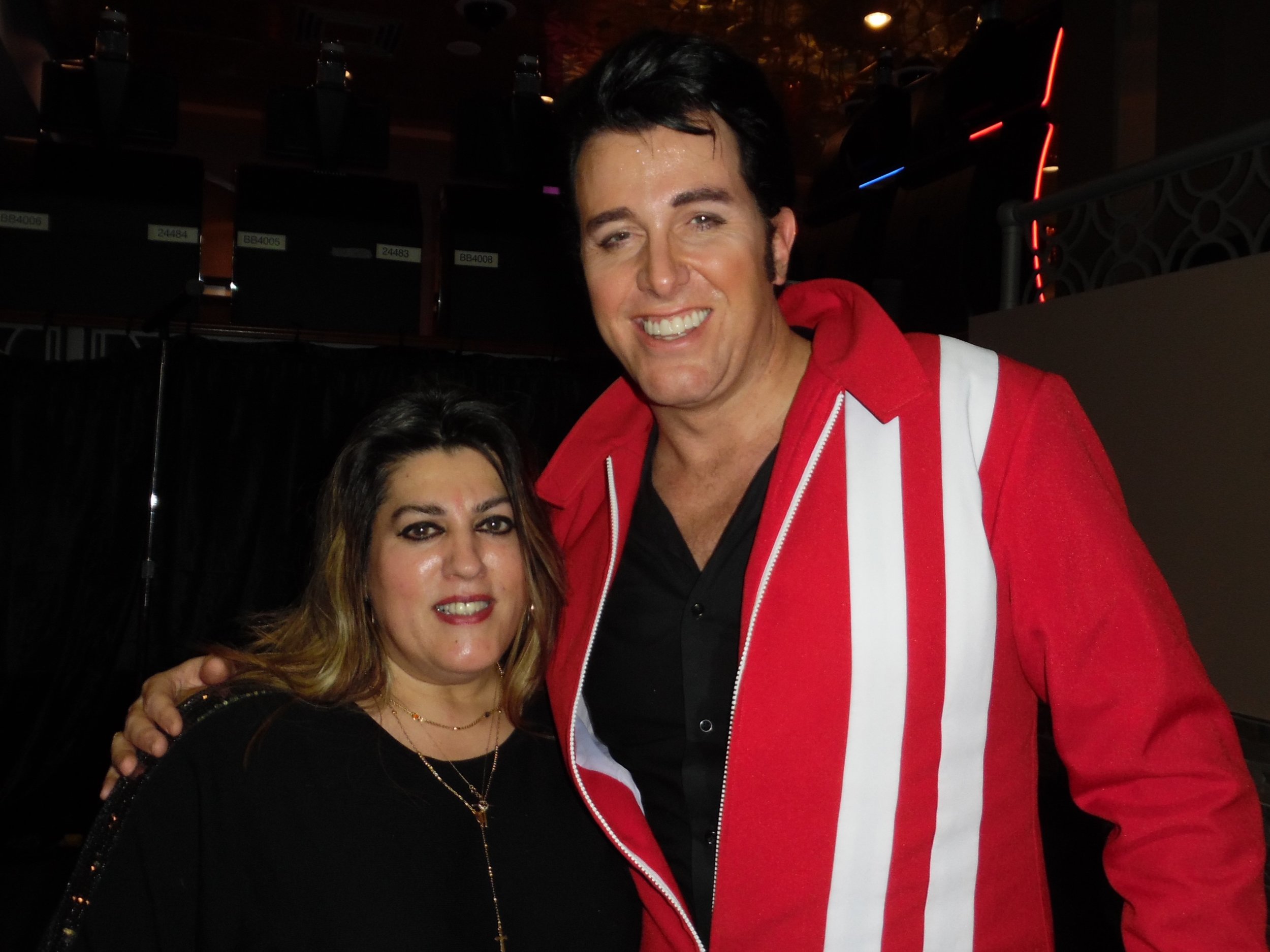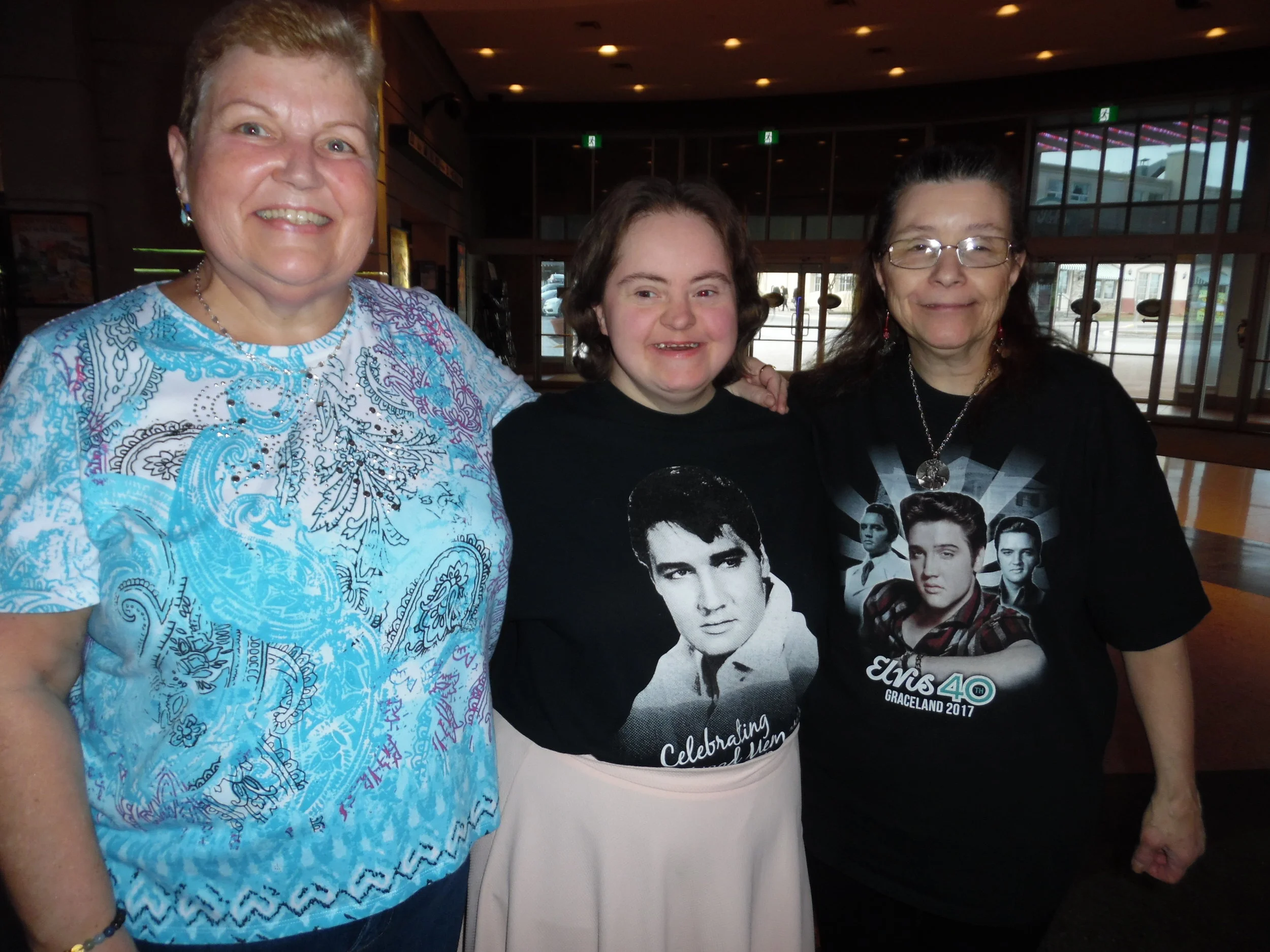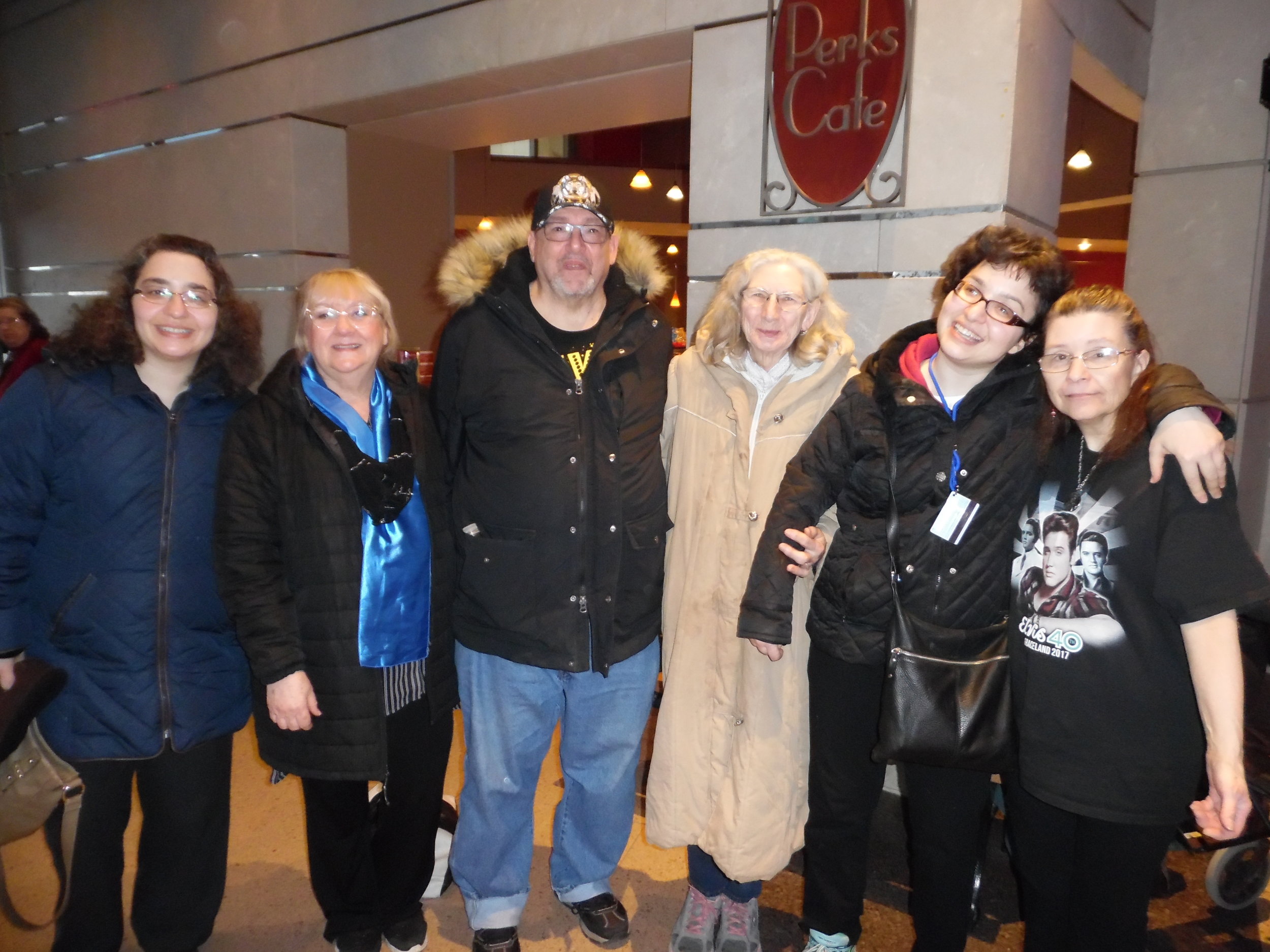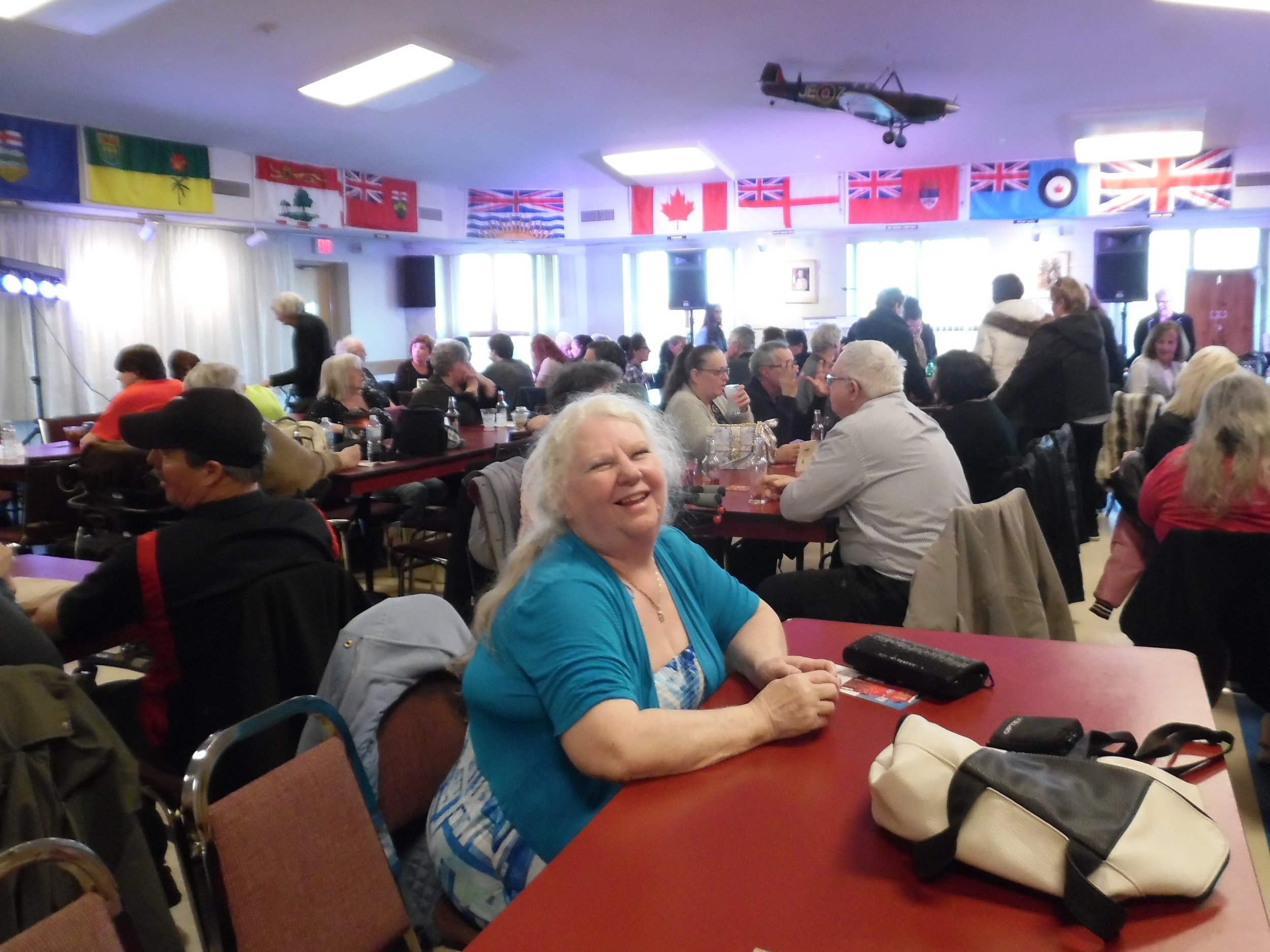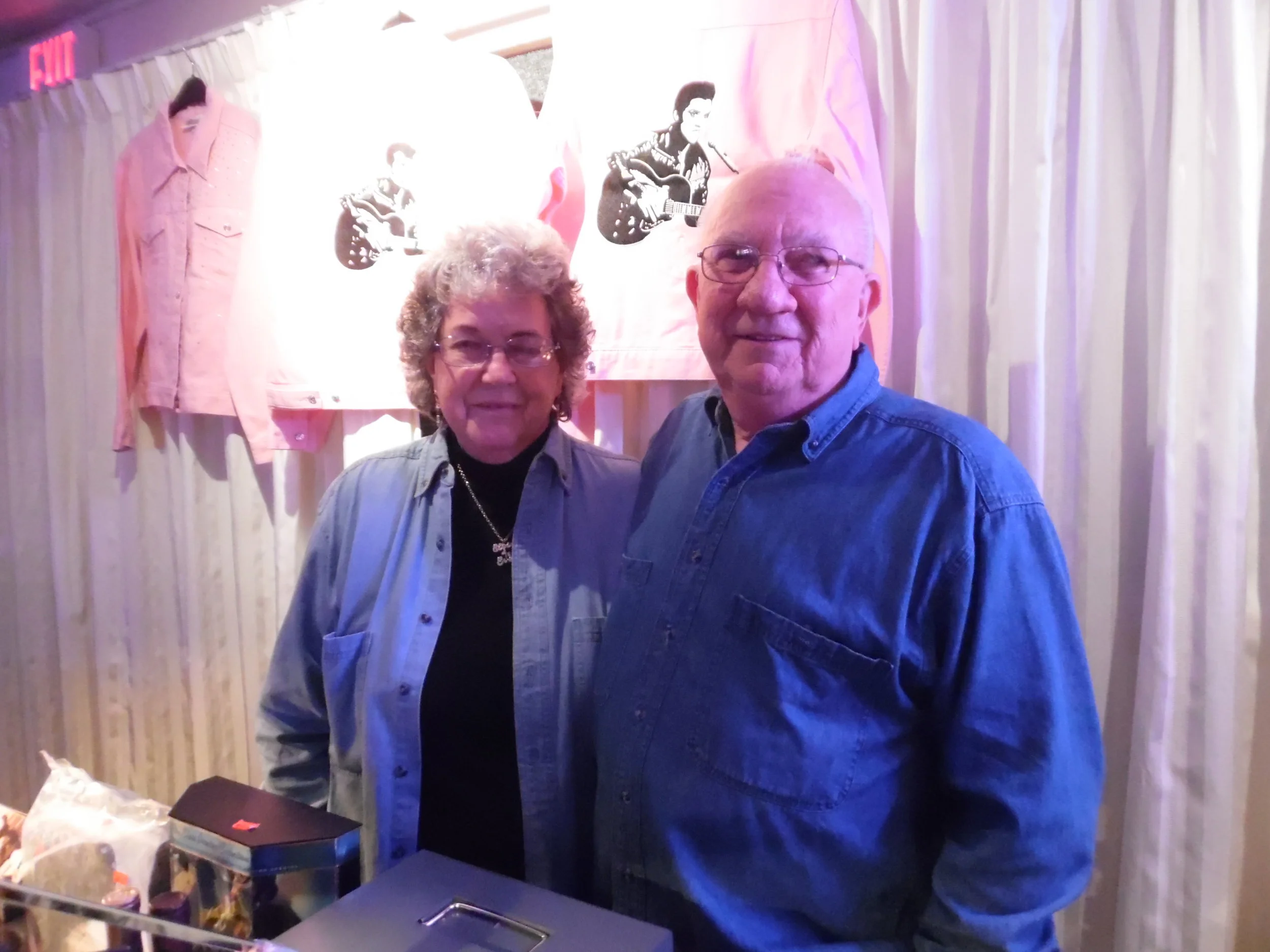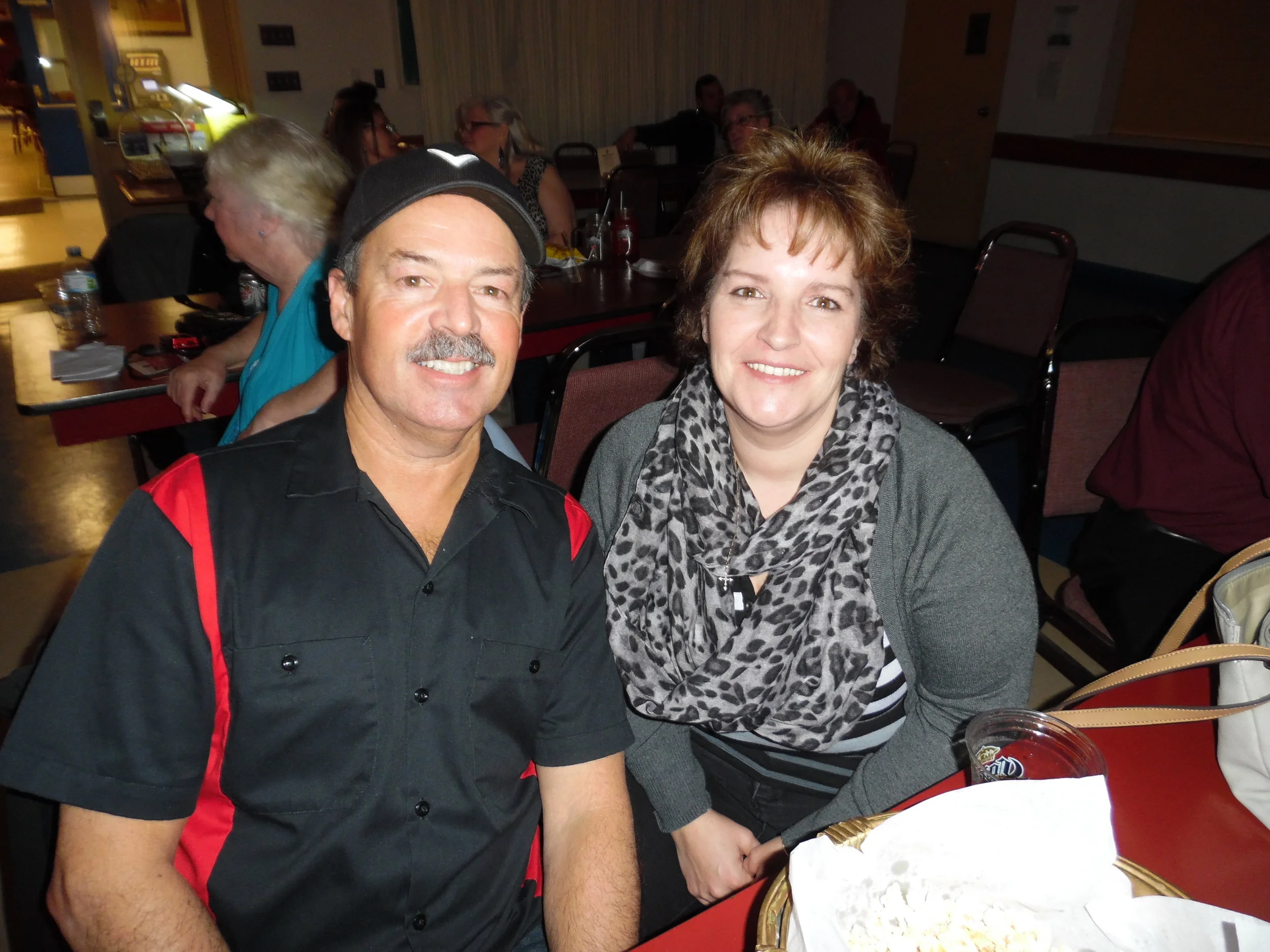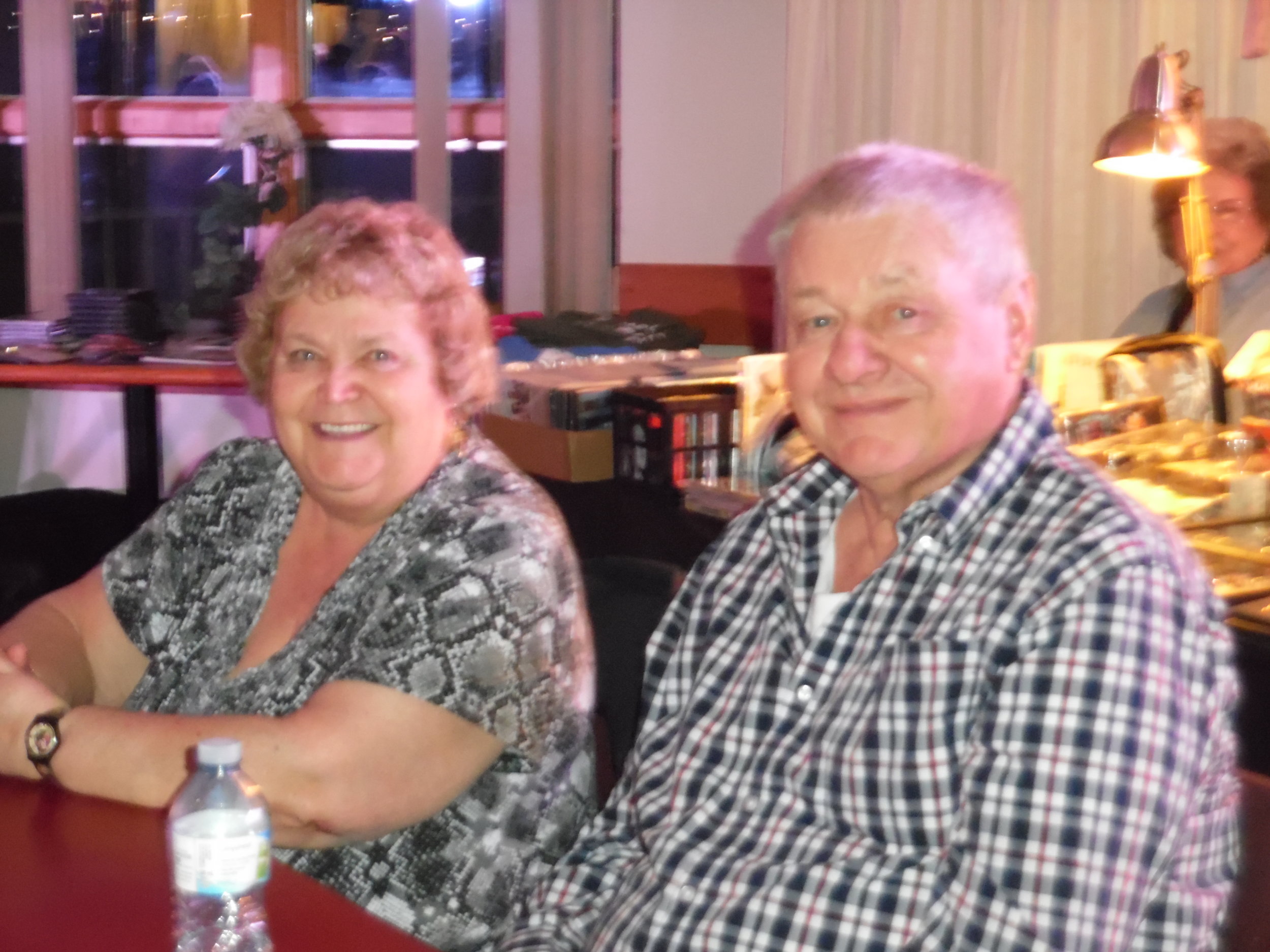Introduction
ETA Matt Cage’s family name, Dowsett, is derived from the Old English words douce and dowce, which mean sweet and pleasant. It is a name given to a good-tempered person, and according to fans, friends and co-workers, it aptly describes Matt Dowsett, aka Matt Cage.
Gerrad Everard, who played the role of Jerry Lee Lewis in Drayton Theatre’s production of Million Dollar Quartet, had the following to say about his fellow actor:
Matt is simply the best. His tone, mannerisms, look, energy, skill and charisma that he brings to the stage are all unbelievable. He also has done all the research. If you want to know anything about Elvis, ask Matt--he knows. He truly knows Elvis inside and out, which is awesome because he’s a true fan without being weird about it. It was a true pleasure performing with someone like Matt. He’s so talented. But the best part about Matt is that he is a great guy. Like I said, he’s just the best! Matt’s a great friend and I loved working with him.
Matt’s business partner and friend, ETA Brent Freeman, added some humorous comments about his friend:
Since working with Matt several years ago, I’ve watched him grow--not physically, as he’s all ‘growed up’--but as an ETA. He’s not bad :). He just might make something of himself someday...if he works real hard. In all seriousness, not only is Matt a great friend and business partner, he is a GREAT ETA! One of the best for my money!!! P.S. He told me he’d give me $10 to say nice things…I’m still waiting!
If you saw Matt's performance in MDQ, or if you have been to one of his shows, you already know of Matt's incredible talent, wit, and charming personality as an ETA. In his interview answers, you will see that Matt is a "guileless, nice individual, with a friendly, energetic manner that is so likable that it's difficult to resist him." (www.sunsigns.org)
Thank you, Matt, for consenting to be interviewed. Your good nature, sense of humour and honesty that shine through in your answers will delight your myriad of fans. Best regards, Carolyn.
The Interview
Q. What adjective best describe you when you were a child?
A. In one word, I was "awesome", haha. I think in all seriousness, I would say optimistic because I felt that anything was possible and I had a general sunny disposition.
Q. Were you quiet or talkative as a child?
A. I was talkative at home, but more quiet in public. However, in school I was a bit of a character always being sent to the back of the room/hallway/chalkboard (do they even have those in schools anymore? lol) or wherever chatterboxes were sent by teachers to stop them 'bothering' other students.
Q. Did you have childhood aspirations to be a stage performer?
A. I did, but I was always into sports. I played soccer and softball, but really loved hockey. Hockey was my biggest passion...Go Leafs Go! However, I'd watch old sitcoms and wonder what it would be like to be an actor and began mimicking things they would do on television. Later, I'd started mimicking Elvis--and I think you know how that turned out!
Q. Who first realized you have an excellent singing voice?
A. I was always nervous singing in front of others. When I was in grade 3, our music teacher came around to listen to each student sing individually as we sang as group in class. I remember being mortified when she came by and listened. I stared straight ahead and wished she'd just move on! After class, she told me that she was very impressed by my singing and encouraged me to sing more. Now, you can hardly shut me up!
Q. Did you take singing or guitar lessons as a child?
A. I took guitar lessons for about six months as a young adult so that I could quietly sing Elvis songs in my living room (by myself...I was still a nervous singer). I lament that I didn't start sooner.
Q. How would you describe your experiences at high school?
A. Not great. It was a strange time for me and my family. My parents had divorced a couple of years prior and there was a lot of upheaval in general at that time in my family life. It led to me not being a great student. I got a job at Blockbuster Video and liked working, so that's what I ended up doing mostly. I dropped in and out of school for the next few years and switched schools a couple of times. I ended up 'dropping back in' in my early 20s and finished up earning my diploma. It was a proud achievement.
Q. What did you do after earning your high school diploma?
A. I worked several jobs from retail to call centres to selling mutual funds. I usually rose up the ranks but would ultimately hit a ceiling because I hadn't gone to college. So not so long ago, I went to Conestoga College and graduated from the General Arts and Science program, as well as Recreation and Leisure Studies.
Q. Before 2011, had you performed as Elvis in any private or public venue?
A. I never officially performed as Elvis prior to my Collingwood Elvis Festival debut, which was insanely nerve wracking! Though I spent a good year rehearsing and preparing my costumes beforehand, I had just dyed my hair black (I'm a blonde) the night before and my first performance with The Casino Brothers Band was in front of a crowd of thousands! There is a gem (I use the term loosely) on YouTube if you're inclined to search for it, haha. Before that, I would sing at house parties and karaoke. Elvis and the Beatles were always my favourite choices.
Q. What circumstances led to your first Elvis contest entry?
A. I was always a big Elvis fan. When I was about 20, I went to Graceland with my sister and her partner for a vacation. From then on, I was completely enamoured by the King. I began to emulate him more and more, singing at parties and karaoke. People would tell me about the Collingwood Elvis Festival and it became a source of intrigue for me. In 2010, the year before I entered my first competition, I went to the festival to watch and learn. It was daunting just thinking about entering, and I was not sure what to expect. One thing I knew for sure, I HAD to try it. I had thought about it for years and decided to make it happen.
Q. What advice did you receive about becoming an ETA?
A. I received both good and bad advice. I find almost every ETA in the business is happy to offer advice about their experiences. I look up to many in the business and really learned by example in a lot of cases. I was able to use a lot of my working experience and apply it to this business. For stage, most of what I have learned came from watching Elvis in his movies and concerts. We are truly blessed to live in the age of the internet and YouTube!
Q. How did the leap from non-professional to professional ETA occur for you?
A. It happened for me quite quickly. I was blessed to have early success. I'd like to think it was my year-long preparation for my first festival that helped me there. I recall one well-established ETA telling me after one of my first contests, "What are you doing in non-pro? Go pro!" I quipped, "But I just started!" Well, he was right, because shortly thereafter I entered my first pro category and won. I haven't looked back since.
Q. What are the most rewarding parts of being a professional ETA?
A. I am an Elvis Presley fan, and as a fan it doesn’t get any better than portraying the person I idolize. By paying tribute to Elvis in performance, I am keeping his legacy alive. It is very rewarding to brighten the days of those who love and remember Elvis. I also love to travel and must say I'm getting to see some wonderful parts of Canada and I am beginning to see more of the USA and Mexico. I have worked in Costa Rica a few times and will be on cruise ships soon. I would love to perform in Europe and Australia--goals for the future!
Q. If it were possible, what question would you ask Elvis Presley?
A. Where have you been these past years? A lot of people have been looking for you!
Q. Is there a song you wished Elvis had recorded so you could perform it on stage as an ETA?
A. "Born to be Wild" by Steppenwolf. It came out in 1968. Can you imagine if Elvis had sung that in his black leather suit on that famous TV special?!
Q. What are the benefits of teaming up with other ETAs in concert?
A. There are many benefits. Some ETAs specialize in one or two eras of Elvis' career. Right now, I'm in a great place where I feel I can positively portray a younger Elvis and the concert era, with everything in between. In time, I'm sure that will change and I'll focus on the concert years as I get older. So, right now, I like working with other ETAs who do other tributes. My good friend, Brent Freeman, is a great example. He does Elvis but also does a great job as Buddy Holly or Jerry Lee Lewis. So I'll be Elvis in our shows and he'll do the others. Now, if something happens where I can't perform all the Elvis stuff, I have a back-up or 'stunt Elvis'...haha. I do, however, also like doing shows with other people doing Elvis as well because I know certain audiences like a variety of ETAs. A lot depends on the style of show. One of the best benefits is you get to have a lot of fun backstage with the other performers and it's an overall less-stressful situation.
Q. Do you select the ETAs and other tribute artists with whom you share the stage in concerts? Or are selections made by agents and organizers?
A. It is a little of both. If I am organizing a concert myself, I make the decisions of whom to book. Other times, it is the organizers of the events who book the talent. Sometimes an agent will do the booking and then hire us.
Q. How are the locations where you perform chosen?
A. Some venues are selected by agents and organizers. I may get a call from a group that needs a performer at an event at a predetermined location. If I am booking a venue, I try not to pick a location where other ETAs frequently perform.
Q. Before Million Dollar Quartet, had you done any acting?
A. Yes, every time I pretended to be sick so I didn't have to go to school...some real Oscar-winning performances there! But more traditionally, I did some acting in school with my Theatre Arts classes. I loved to play the oddball or quirky (okay, geeky-nerd roles suited me well in high school) parts and did quite well with it. Later on, I did a few productions with community theatre in Belleville. After I began performing as Elvis, I did a play called Elvis Loves Patsy where it was a blend of acting and concerts--a “what if Elvis and Patsy had met and performed together”.
Q. How did you get the role of young Elvis in Million Dollar Quartet?
A. I was considered for the role in Las Vegas prior to performing in Ontario, but there was a lot of red tape that prevented me from acting in the US. Then Drayton Entertainment contacted me (they had just found my website I believe) and asked me to come and audition. The rest is history.
Q. When you look into the audience, what catches your eye?
A. Usually blinding lights!! I can't see two feet in front of my face sometimes, haha. After I adjust, I love to see all the friendly faces. Sometimes after a concert, someone will ask why they didn’t get a scarf or something. Truthfully, when I see familiar faces when I give out scarves, I assume that I probably gave them one at an earlier concert.
Q. What words best describe your favourite audience?
A. An enthusiastic audience is awesome!
Q. How do you define a successful concert?
A. As a performer, I feel a concert is successful if I connect with the audience and we all leave charged up and happy.
Q. What is your connection to King Attractions?
A. Brent Freeman and I are Co-Presidents/Founders of King Attractions, which produces live festivals and individual shows. Brent performs as Buddy Holly, Jerry Lee Lewis, and Elvis, and I perform as Paul McCartney, Elvis, Jim Morrison, and Johnny Cash…with more to come.
Q. How will you know when it is time to retire from performing as an ETA?
A. I really don't know for sure, but I've always thought as long as I can watch a video of me and feel that I'm doing his memory justice, that's good. I feel that year after year, I'm still improving. When I watch an older video, I think I'm better now. In time, I may find that I look and say, “Wow, I was better then!” That's when I think it will be time for me. Another possibility exists that should I ever arrive at a place where I no longer have fun on stage, then I'm not doing Elvis or my audience a service. I feel that an audience pays good money to see us do our shows and feeds off of our happiness. I will always give it my all! If I'm not able to, I won't do it at all. But I don't see that happening any time soon, so ROCK ON!
Q. What would you be doing career-wise if you weren’t a successful ETA?
A. I would use my Recreation and Leisure Studies diploma and become involved in Recreational Therapy for people overcoming or coping with Illness, infirmity or addiction. I really find that world fascinating and I think it's a great way to help people and still incorporate fun into daily life. Or I'd be a stuntman, haha.
Q. How did you decide on the last name “Cage” out of many possibilities?
A. I had a list of criteria a stage name had to meet. The URL (mattblank.com) had to be available. It had to be short and succinct. I wanted it to sound American for international appeal. And I wanted it to tie into the Elvis world somehow. Nick Cage was married to Lisa Marie and he is a big Elvis fan. I've always enjoyed his work (it's just fun!), so it checked all the boxes.
Q. You mentioned during a concert that the song “Danny Boy” has special meaning for you. Why?
A. My dad had an eclectic taste in music, but he was not an Elvis fan. The only two songs that he liked that Elvis sang were Danny Boy and In the Ghetto. Shortly after my dad died, I decided to learn Danny Boy (I already knew In the Ghetto well and would sing it whenever he asked). I was driving home from Oklahoma (where I did a contest and finished 2nd--so close!) and decided to put the many hours to good use. I would listen and sing the song and ended up blubbering and crying half the time (people seeing me behind the wheel in that condition must have really wondered about me!), but eventually I got it down pat. To this day, every time I sing the song, I close my eyes and think of my dad.
Q. Were you prepared for how being an ETA would change your life? In what ways has your life changed?
A. I couldn’t have dreamt how my life would change as an ETA. It changed everything!
Q. What is the downside of being an ETA?
A. I am away from home a lot. Personal relationships suffer. And the pay is not always steady; it is not a 9 to 5 job.
Q. Do you have any rituals you preform before going on stage?
A. Not really. I just try to stay loose. I really should engage in a proper warm-up routine. Maybe I'll make that my New Year's resolution.
Q. How do you keep yourself grounded while working in the entertainment world?
A. In the “real world”, I am just an average guy. At the time when I had my first early win, I was going to school, working for FedEx, and performing as Elvis on the week-ends. The day I won the professional early years competition at Collingwood, I went to the after party celebration for a bit before heading to FedEx for my shift that started 4 am. Still wearing remnants of my stage makeup, I was working away loading trucks in a dusty warehouse. It keeps you grounded…haha.
Q. Do you think being an ETA has changed you as a person?
A. Yes. I take better care of myself and try to appreciate every minute of this life Elvis has given me.
Q. Are you still able to lead a relatively normal life when not on stage?
A. Yes, but it would be hard to go back to the same life I knew before becoming an ETA
Q. How do you relax between concerts?
A. I watch Netflix and hockey mostly...Go Leafs Go! (I know I said that earlier but hey, for once we are having a great time and I'm telling everyone about it!). I also like to spend time with loved ones--and by loved ones, mostly my cats Holly and Snowbird, haha. I got them at Christmas time and wanted wintery names that tied into Elvis somehow. So they are both named after songs he did: “Holly Leaves and Christmas Trees” and “Snowbird”, originally made famous by Canadian singer, Ann Murray.
Q. At what age did you realize that people find your comments amusing?
A. I am not sure at what age, but I have always been a goofball. I always try to find the lighter side of life.
Q. How would you describe your rapport with your audience?
A. I think my audiences find me to be genuine--I tricked them good, I tell ya! I try to put myself into all my shows and not try to replicate everything Elvis said and did, word for word. I do try to keep it in the style of Elvis all the time, so you might not even realize what is Matt and what is Elvis.
Q. Is there anyone in your family or circle of friends who show signs of becoming an ETA? What was the reaction at home when you said you were going to compete and perform as Elvis?
A. I don’t know anyone in my family or circle of friends who want to become an ETA. My mom thought it was amusing at first when I said I was going to be an Elvis Tribute Artist.
Q. What advice do you have for anyone considering becoming an ETA?
A. Don’t! There are enough of us already! Just kidding. I would tell them that they have to love what they are doing. It is important to talk to established ETAs to find out what they know about being an ETA. Take a healthy business approach: Market yourself and build a website. Conduct your ETA career like a business. My business acumen has set me aside.
Q. What would fans find surprising about you?
A. In childhood I was so shy that I wouldn’t sing in public. One time when I was young, my sister heard me singing in the shower as she passed the bathroom door. “Nice singing, Matt” she said sarcastically. I was mortified! So, I stopped singing loudly enough for anyone to hear me. People might be surprised to learn that I have naturally curly blonde hair. I use a lot of products to blacken and straighten my hair.
Q. What do you consider your trademark moves on stage?
A. I don’t know if I have any trademark moves. I try to make each performance my own while still holding true to what Elvis would have done. If I think Elvis would have done something different that fits this time period, I will put it in. I like to incorporate the humorous, lighter side of Elvis Presley into my act.
Q. What is the most surprising incident that happened during a concert?
A. I lost the top register of my voice while I was performing in Las Vegas. It was a part tech/part live band set up, so the song choices couldn’t be changed. The song list played on, but I could only sing the low notes. It still went well, though, because after the concert people asked if they could buy my CDs. Oh, and one time someone threw me a man's sock. Sure, Tom Jones gets ladies underpants tossed at him and I get stinky socks!?
Q. What does the future look like from your point of view?
A. I am always looking for the next thing. Right now, I'm looking at doing more acting. Not just Elvis stuff. I really enjoy the theatre and know that Elvis himself would encourage me to be me and do stuff for me. Hopefully I can do something there. Also, I'd like to be more involved with show production and promoting the next generation of tribute and musical acts.
Friends and Fans
The Humour and Wit of ETA Matt Cage
I watched a lot of videos of Matt Cage’s performances in preparation for his interview, and found myself laughing out loud at some of the things he says during his shows. Matt’s speaking voice has dulcet tone that is soothing and pleasant, and when combined with the charming way he expresses his thoughts, his comments are always met with laughter. The following excerpts from Matt's shows, which I compiled from several videos for your reading enjoyment, highlight Matt's good-natured sense of humour:
In Tupelo, Mississippi, in 2013, Matt handled a heckler’s comment about his loose-fitting blue velvet shirt with a quick comeback. “Thank you, friends. What do you think of my shirt? I felt compelled to wear it here.” “Why?” a shout came from the audience. “It just struck me this morning when I got up…I feel blue and puffy.” After the audience stopped laughing, Matt continued. “I drove about 3 ½ years to get here…at least it felt like it. I drove all the way from Canada. You can tell by my accent I am from Canada—Southern Canada. I’ve been to Tupelo before, to the birthplace…and a couple of bars.” More laughter followed.
Also in 2013, at performance in Collingwood, Matt joked about his name change. “So my name’s Matt Cage. I used to be Matt Dowsett; but you see, the police wanted me, so I had to change it. No. I am only joking, friends. Cage is just a lot easier to spell.”
In 2014, as a special guest at the annual Collingwood Elvis Festival, while singing the song “Trouble”, Matt changed the words from “I don’t take orders from no kind of man” to “I don’t take no orders from no John Cigan,” garnering much laughter from the Collingwood audience who understood the reference to seasoned ETA John Cigan. Matt then added, “I had to do that song; it’s treated me real well here before; and let’s face it, that’s what I am.”
At the 2014 Lake George Festival after Matt was introduced, there was a delay in the playing of his gospel music. Rather than standing there awkwardly, Matt said to the sound man, “I know it is Sunday, but are you sleeping too… whenever you are ready, son.” Still no music; so Matt turned to the waiting audience and said, “I am going to do a 20 minute sermon on the evils of Lazy Boy chairs.” The announcement was met with laughter.
At one of the many concerts at St. John’s Anglican Church in Madoc, Ontario, Matt used exaggeration to amuse the audience, “It’s about the 600th time I have been here.” He then added, “Every time I’m here, I’m never disappointed—well sometimes; but I keep it to myself. Hello ladies. I see you waving, kind of. I don’t know who you are, but you look friendly. It’s going to be a long night, and we only have four songs; but the rest is like a vaudeville sort of thing. We are going to do skits, and I think there is a pie in the face.” The audience found Matt’s quips very funny.
Matt’s DVD, Three Decades of Elvis, recorded at the Empire Theatre in Belleville in2014, is a cache of entertaining comments and behaviour. In his first set he saunters across the stage, and gives an approving thumbs-up to his own poster. In the second set, Matt, wearing the ’68 leather suit, says to the audience, “If you see a guy outside with a motorcycle looking really cold, don’t tell him where his suit is, okay. Keep that between just us friends.” And then he added, “One thing I learned just a minute ago, changing into a leather suit while you’re sweating, ain’t that easy I’ll tell you…I almost worked harder back there, then I did out here. Later in the same set, while sitting on the stage, Matt said to the audience, “I like to come out here and connect with people in the audience; and I like to connect one on one with people and make them feel real uncomfortable. I think it is real important to do that.” Matt’s curved comment was met with a round of laughter. Even when he isn’t trying to be funny, people laugh at his comments. Matt, dressed in his peacock jumpsuit, said, “Thank you very much,” just like Elvis, and everyone laughed. “That wasn’t a joke.” Then he went on, “So what do you think of my suit? I bought it at Wal-Mart—a Rollback Special.” The audience was a little more exuberant than they were before intermission, so Matt asked, “What did you folks get into at the intermission? Whatever it was, I want some!” After he was given a note about someone’s birthday, he asked the audience if anyone else was celebrating a birthday. So many people raised their hands that Matt commented, “Let’s go back nine months…what was going on? It must have been cold or something.” And when he heard something fall from his suit, Matt made the audience laugh with his quick wit, “I’m falling apart. I just knocked a jewel off.” Picking up the jewel, he walked towards the audience saying, “There’s fifteen bucks. I’ll tell you what, here you go (handing the jewel to an audience member). You take that, put in a drawer for about 10 or 15 years; and when you take it out, it will still be worth nothing.”
Matt’s comments to the Ypsilanti, Michigan audience in 2015 were very amusing. The audience couldn’t get enough of his attention, and he spent an entire song on his knees. “My lips are getting longer,” he joked, after kissing a dozen fans. And adjusting his leather jacket that had slipped up, he said to the audience, “What are you looking at?” knowing they had quite a view from behind. When the song finished, Matt said, “You are a very kind, considerate, if not grabby, audience; but that’s okay. I don’t mind.” Commenting on the sweltering heat, he added, “Black leather in the middle of the day; man, I don’t know what I was thinking. By the end of this set, there is going to be a pile of goo with a black jacket on it. You’re wearing me out. We are going to keep on going with some movements for you. Even if it kills me, I’m going to entertain you tonight—this afternoon (he corrected)! See, I’m all confused…the heat stroke is getting in there.”
Performing with the Déjà vu Band at an outdoor evening concert in 2016, Matt commented, “It got quiet out there; can I hear you?” The crowd responded with a cheer. “If you weren’t there, I would just go home.” And at a King Attraction event in the same year, Matt said to the audience, “We did the 50s; we did the 60s; and now we’re doing the…?” The crowd responded with, “The 70s!” Matt continued to engage them with, “You were smart last time, and you are still smart this time. I like this audience. Give yourselves a round of applause!” Then as Matt began to sing, he put his pants pocket, saying, “I normally don’t have pockets.” Everyone laughed knowing he usually performs in jumpsuits or leather.
I was at Matt’s concert this year when a fan came up to the stage while he was in the middle of singing a song and carried on a conversation with him as if they were the only two people in the room. She wanted to hear “Teddy Bear”, which he had just sung a few minutes earlier. She started telling him a long story about her dog whose name is Teddy Bear. To those watching, it was both funny and annoying. Matt let her ramble on a bit, then said, “I have a show to do right now; maybe we can talk later.” The lady shook his hand and walked away taking no offense. Matt handled the disruption to his show with humour and charm.
Excerpts from an article by Carolyn MacArthur.

